#not everyone is good at actually. being mature enough to handle that nuance. when they try. people can be wrong
Text
im gonna be real anon I don't care about label shit ship discourse I care about if real people are getting hurt and ONE reblog from someone being jokingly aggressive on the subject isn't enough to convince me that people are getting hurt when there's more evidence to the contrary. you've put me in a shitty situation here and I don't want to engage with it. please just ask people what they actually think next time before you go throwing your assumptions at other people.
#i trust enough that most of my mutuals understand the nuance needed of media depiction of unsavory subjects.#if i'm wrong then I'm wrong. okay. thank you.#i hate the dichotomy i hate the lack of nuance in this discussion I want people to actually talk to each other#I want people to realize that you can respect people with different opinions than you if they aren't actually hurting anyone#I'm literally. someone who was alone with me a lot as a kid is in prison for CP/solicitation. I think if anyone can say that media-#depiction of fucked up shit that really happens is more nuanced than 'x is bad so it shouldnt exist'#you cant do that in real life. you cant make something not exist. just because something fictional contains it doesnt mean it condones it.#im so tired. im so tired. why wasnt this a dm. i dont really want to have this discussion publicly.#i can think things are gross but understand that there's nuance to depiction and just because I don't like it doesn't mean those people-#-don't deserve to have something that understands them.#not everyone is good at actually. being mature enough to handle that nuance. when they try. people can be wrong#and if people ARE weird I can just not engage with them. there's. I can decide for myself!#and now I'M stuck in my brain is insane and. as if! as if people always reblog things they 100% agree with!#im so tired. im so tired. im in pain and people are messaging me about a singular reblog from six months ago on someone else's blog.#i understand being cautious i really do but thats like insane behavior. why are you putting this on me. why didn't you just talk to me.#fucked up things happen and people deserve to be understood. okay. even if i don't like it. there is no right answer. there is no world-#where all pain can be avoided. saving private ryan made vet suicides skyrocket. did you know that#but it also understood those people. yknow. and there's more people living that it understood too.#there's just so much nuance that's thrown out when you cover everything you don't like with a blanket. okay#it's more complicated. it's more complicated. please.#in my mind it's far stranger to assume everyone is out there giggling and twiddling their fingers thinking about in/cest#than it is to just assume they don't until proven otherwise.#im so tired. just block me if you don't understand where I'm coming from. I don't care about ship disco/urse and i dont want to live-#constantly worried about what other people think about shit that has no right answer.#everyone is innocent until proven guilty and one reblog of a joking aggressive post isnt enough for me. sorry.#phlyaros' nonsense#euurgh.#welcome to the internet where we judge people based on one reblogged joke and nothing else even if it contradicts us#what a perfect encapsulation of what I don't like about dichotomy argument#tw suicide
3 notes
·
View notes
Note
Hi, do you have some adices for diffrent types before christmas? I am ENTJ and I will spend christmas with ISFJs and ISTJs. In the past, I felt a lot of alienation in family life, often with a difference of opinion I felt that I was "me" versus "them." I would like to have a good relationship with them while feeling good about myself.
It's unfortunate that some people don't feel safe in family but rather feel stuck with a family they never chose. Some family members don't turn out to be very compatible with you for reasons such as the one you stated of being too different or having too many differences of opinion.
When children feel alienated, there is a reason for it. You have not specified the reason, which means it's difficult for me to understand what the root of the problem is. Obviously, your family has not understood you to the degree you desire, nor you them, but why? What is the obstacle between you exactly? Can't solve a problem without targeting the cause.
Since you are vague, I can only give you a generalized response. Family relationships get very complicated when there is a long history of unresolved issues between members. As problems are continually swept under the rug, past hurt can linger on indefinitely. Most adults try to carry on with life using an "out of sight, out of mind" attitude but then get shocked by how deeply they are impacted by the unresolved issues every time they come face-to-face with family.
Ideally, the best thing to do is approach each other as the more mature individuals you are today, rather than from the perspective of the individuals you were in the past. This makes it easier to communicate about unresolved issues calmly, work toward mutual understanding, and eventually resolve them to mutual satisfaction. Only then can everyone heal and move on with a clean slate.
Unfortunately, resolution is difficult to achieve because it rests on the assumption that everyone involved has actually matured to some degree, at least enough to look back at old problems with greater objectivity. In reality, this isn't always the case. In reality, it's easy to regress and become that child again, feeling hurt and alone. In reality, it's easy for everyone to just repeat old patterns of conflict.
No matter how much you want to heal a relationship, it isn't possible as long as there isn't a matching willingness and commitment from every party involved. Hope for improvement can only be sustained when every party cares enough about the relationship to try and make it work. Do your family members display such willingness and commitment? If so, good. Then you need only remember that the key ingredient of healthy relationships is kindness. No matter what you need to say or do, always proceed with kindness first and foremost, and the rest will work itself out in due time.
In cases where there isn't enough willingness and commitment from them to resolve past issues, the best thing to do is set appropriate boundaries to protect yourself from getting hurt again. This means learning to handle relationships with more nuance and skillfulness:
Take responsibility for your feelings and emotions so that you act upon them in kind, reasonable, and constructive ways.
Speak only from your own perspective when communicating and avoid casting judgment and blame.
Put categories in place to ensure you classify each individual appropriately with regard to how intimate/close you should or shouldn't get to them.
Put rules in place to ensure that you do not invest more than you get in return.
Explain to people what is and isn't acceptable when interacting with you and what will happen when they behave inappropriately.
Enforce reasonable consequences in the event that your preferences, rules, or boundaries get violated.
Dealing successfully with family means rising above and being the adult in the room even when others can't, even when they are pressuring you to be your childish self. Refusing to participate in old relationship dynamics is the way to stop replaying them. Are you capable of it? No matter what happens, it'll be good practice. I always approach big family gatherings as a challenge. I challenge myself to put into practice all the things I've learned about how to be a good person. In the event of failures, I learn from them and try something different the next time. Happy holidays and good luck to you!
10 notes
·
View notes
Text
Ok, serious talk, I know nobody wants to read this but I'll feel better posting somewhere as opposed to vomiting my feelings all over my friends again, they've had enough, please feel free to ignore this and I'll be back to being silly in no time
Ok so, I know my blog is uncomfortable to read, I understand that my negativity and constant venting is at best annoying and at worst upsetting, i am aware of that but I also know that bottling up is worse to me and i feel like a liar if i just pretend everything is fine and just post silly stuff here.
My friends keep telling me I'm not a horrible person and am pretty funny actually and I think that is because they've know me for years and I was like that but things have not been going well im the last few years.
Yes I am not a bad person and I can be funny sometimes, but all of that gets overshadowed by the numerous mental issues I have and cannot cope with properly.
English is not my first language language so this gets a bit confusing because this nuance is pretty tricky in the language but as you all know is that "i am" can mean either "i am like this at the moment" (example "I'm cold" or "I'm hungry", those are not things that are inherent to you, they are temporary states) or "i am like this PERIOD" (example "I'm human" or "I'm Brazilian", they are permanent states about yourself)
Now
I know I AM (inherent) creative, funny sometimes, alright at drawing, and a bunch of other nice things people say about me when I'm crying, but you have to understand that i also am (temporary) completely fucked up mentally and emotionally, I'm not saying I'm going to be "cured" from being autistic btw, I'm counting not being able to handle my issues "being a bad temporary thing", like, i will never stop having ADHD symptoms (cannot afford a diagnosis so I'll just call them symptoms for now, or signs if you thing the word 'symptom' is a bit tone deaf) but i know i can learn how to live with it and function, even if my functioning looks very different from what's expected from a neurotypical person.
I am, at the moment, NOT DEALING WITH MY SHIT PROPERLY, and THAT is the issue I believe can be fixed. I will never have a good knee again, even after the surgery I just feel less pain, but i can learn how to adapt to my limitations, you know?
So, I am not, inherently, a failure, i know I'm not stupid or ugly or boring, but I'm so full of debuffs that basically I'm a piece of shit right now.
Yes, I did quit my job and tried to become a web developer and it went catastrophically bad, but I can't even count that as a failure because i NEEDED to quit that job either way (it was destroying my mental health) and if you're gonna quit going to live with a friend so dear to you she's basically a sister for a while and learning a skill you always wanted to at least start learning, isn't it worthy?
Yeah I "failed", but the happiness i felt along the way was worth even if it didn't work out in the end.
I know that, my mind knows that, but my feelings are absolute chaos and I sometimes fall into a deep self hatred spiral that makes me believe lies about everything around me, it even makes me believe everyone secretly hates me, which is OBJECTIVELY not true, if there's one thing I am in this world is loved.
I know it's sad, annoying, or even upsetting to see my posts and I'm not going to pretend they're inevitable, I CAN stop myself and I should have better restraint, I'm failing at that and I apologize for all the negative feelings I might have caused.
I know it's a pretty hard goal considering how my life is a huge mess right now, but my goal in life is to be the trans person i needed to meet when I was in the closet.
I want to be the type of happy, mature and intelligent person that my friends were when I met them 6? 7 years ago?
The people that completely shattered an entire lifetime of prejudice and fear that was forced into my brain since i was a toddler, the type of people that made me look at transphobic posts and go "that's not true, I've met trans people and they're some of the best people i know", the type of people who made me realize living as who you really are is both possible and achievable.
I want to be that person, someone who, just by being themselves, can melt away prejudice or at least be that kink in the armor of an angry reactionary that one day will help shatter the barrier of lies they protect themselves with and help them see that this hate was manufactured to use them as paws in a stupid made up culture war.
I got out of this horrible place with the help of wonderful people i will never be able to thank enough, and my dream is to help others out too.
I'm not saying i want to "trans" others, obviously, just to show that we are not the weird monsters thet so many out there want you to believe we are. To destroy the prejudice with the power of a honest, happy existence.
I want to be the person I needed when I was younger, lost, depressed, considering suicide, and constantly angry at anyone the liars and grifters who I trusted told me to hate.
I want to become the person who would have saved me back them.
I know it's going to take a lot of work, I have many barriers ahead of me, some inside of myself, some external, but neither way I have a LOT of work to do, and if there's one thing i can never do is give up.
I don't even know what "giving up" means at this point, I have to keep going, not only for myself but for those I might help in the future.
I can't change the past. I can't erase the harm my bigoted ignorant words caused, but I can grow into a person who heals as much as i used to hurt.
I know I'm a handful right now, and I am trying to control my words until i have the means to work on myself and improve as a person. Just, please be patient with me. If my posts upset you in the past please for your own sake unfollow/block me, I'm sorry I hurt you while trying to hurt myself, but unfortunately it will probably happen again, and there's nothing wrong with distancing yourself from someone that hurts you, even if they didnt INTEND to hurt you.
I am NOT (inherent) a failure
I am (temporary) failing
But I will get better.
I don't know how, I don't really have a plan, but I will figure it out somehow.
Life is not a game. I am not in a "doomed run", I can and I WILL live and be the best person I can be.
Thank you.
3 notes
·
View notes
Note
I understand your point but "Rape" is not about interpretation. The book has multiple rape scenes, worse are the vegaspete ones where pete actually passes out because of the pain of being rape multiple times. I was thankgul on how the series handle it but still we cannot dismiss the abuse. We can like the fictional story but minimizing the abuse on it is not how to. The whole separate art from the artists for me doesn't work when you see the abuse the actors went through. Like I said, is not up to interpretation on the books (especially those authors have several of them) there are multiple rape scenes and people needs to acknowledge the issue with it because those scenes are made as romantic when they were not and people needs to understand why that was wrong.
Listen anon, I'm not going to claim to have read the books or all the official content, so I have no idea how severe or explicit the rape depicted is. But. My general stance on the topic of non-consent or problematic themes in fiction is this; it's the responsibility of the individual, and not the collective, to be accountable for their own experiences and evaluations of media. Basically I believe it's your job, JUST YOURS, to evaluate what you think and feel about something, not someone else's, certainly not a whole horde of people online. You cannot put the burden of moral integrity onto the popular masses. It doesn't work like that. You cannot stand on a soap box and demand that everyone acknowledge how right or wrong something is. it doesn't work like that.
It's not our job as a fandom to stand around talking about how problematic things are in the content we're fans of, as though we have something to be ashamed of. It's not our job, as a fandom, to apologize for the things we like being less than perfect representations of whatever they're popularly representing. It's not our job as a fandom to enjoy the content we enjoy with a big disclaimer slapped in front of it.
It IS our job as a fandom to curate our own, individual experience. And that can look like many things! Discussing the problematic aspects of the problematic things depicted is awesome, I wholeheartedly support you wanting to discuss the problematic themes and relate them to the real world in meaningful ways! It's good media analysis, honestly! But it also doesn't give you a relative moral high ground for choosing to do so, just like it doesn't make you morally bankrupt to not want to. Let me tell you, the entire genre of BL would not exist if people didn't *hand wave* at problematic media. That doesn't make it right or wrong, it just means that obviously it's popular enough that maybe we shouldn't be asking ourselves whether its right or wrong, like we're not all capable of a nuanced, mature interpretation of the material.
However, anon, at the end of the day, if the rape content of the kinnporsche books doesn't sit right with you, then that is fine. It's absolutely ok, and I hope you take care of yourself. But that doesn't make you more, or less, right than the person who does like that content, for whatever reason they might do. Because their experience, like your experience, is completely unique. And it's special. And it doesn't deserve to be shit on for the sake of advertising how aware you are of something that's problematic, nor does the integrity of content creators.
This is very long, but the last thing I will say is that if anyone outright rejects the notion that is IS rape, or that there ARE problematic themes at all, that's a different can of worms altogether, and has more to do with the media maturity of the individual than it does with the source material. But I don't see people doing that. People are, as a rule, pretty well aware of how messed up something is. We all live in a society, after all, we have the evidence of right and wrong in our daily lives all around us. It doesn't need to be uniformly depicted in the books we read, or the media we consume. Suspension of disbelief builds empires, my friends.
And if Vegaspete has depictions of rape, well, then that's just that. That's what the authors chose to do. You can either enjoy it for what it is with your suspended disbelief, or hate it for what it is. The choice is yours.
#fuck this was long and took ages#i hope im not coming across as too dismissive anon i truly do just want to explain my perspective here#i believe in peoples right to enjoy whatever they want for whatever reason they want#as long as they leave fiction in fiction#i dont believe people need to constantly acknowledge how bad something is in order to consume it 'safely'#kinnporsche
22 notes
·
View notes
Text
11 Anti LO Asks
1. I don't get it, weren't the fans praising Persephone for wanting to own up to her crimes and saying she deserves any punishment she receives? Why are they now upset she got a temporary punishment that isn't even different from her life pre-uni? Why is Persephone upset too? It's not forever. It's almost as if the fans only care about the aesthetics of looking morally "good" while they really wanted her to get away with murder, and Persephone is a bad person who lied to keep up her nice facade.
2. I legit do not get why LO fans act as if it's some personal affront when people don't like it and even critique it. How self centered if their worldview to think everyone has to obsessively love and praise what they like? What reality are they living in where this is a thing? Get a grip, kids, you're not important and people not liking what you do is not a personal insult, it's just life.
3. LO would probably be better handled if it was put under an age restriction like more mature romances and other comics are, but WT and Rachel would never allow it because then they can't market it as YA and get the biggest draw of tweens and teens to spend their parents' money on it, so now LO is left w/ trying to be tween friendly while also trying to do serious topics with all the nuance of "bullying is bad >:(" but instead of bullying it's being critical of rich mass murdering slave owners 🤔
4. how does rachel have at bare minimum four people working on LO and it only looks worse?? like is it because they arent paid well, is the pay as low as the effort theyre expected to do. i dont care how much thhe fans are obsessed with it they seriously cant think this looks better??
5. What's going to preemptively anger me is that with IRL people I know, r/aita, and even tumblr anecdotes, giving a teen time away from a grown man for a long enough period of time usually results in the teen going, "wow, that was actually fucked up. thank you for stopping that disaster." Yet I KNOW that in LO, Persephone's probably gonna have her love grow by tenfold and miss her dearly totally-not-creepy beloved.
From OP: On a side note, I hate when fans try to justify the age gap by saying “it’s normal” or “perfectly fine since they’re adults” when most people (especially from tumblr, reddit, and just people irl) find it weird as hell and very questionable on the older person’s end. It’s just a blatant lie to try and justify this creepy dynamic.
6. introducing a major villain with no actual build up or reason for them to be in the plot right before a season finale is, no matter how you cut it, bad writing, and that's only one of several poorly planned and executed writing in this thing.
From OP: Yeah, even Apollo had some kind of foreshadowing. The only thing that hinted at Eris was an old tumblr ask from RS (Before LO became an original, RS said something about Eris and Hades having a bad date but that’s probably retconed) and Hera’s line to Hebe about getting her sister. With the sister thing, it’s too vague to pinpoint on Eris since she could also be Nyx’s daughter.
7. ok now LO fans are just lying and saying it was "always supposed to be a dark story" and people who are calling out it didn't develop these aspects well and it should have stuck to its original lighter tone "cant see context clues" like?? yes it did have SA shown early on ... which was IMMEDIATELY dropped and had rachel right way go into making puns! even persephone admitting she killed a village was framed with fart jokes and forced romcom flirting! how is that being a "dark and serious" story?
8. Rachel Smythe seems to have taken a weird approach to making HxP sympathetic? Like, I feel like she's trying to make the infinitely threatening villains more infinitely threatening as a way to make it seem like the rich, straight, cis, white coded deities in the story are the underdogs. The classism almost seems to come from her being too concerned about the image of rich people. Which, come to think of it, actually makes a lot of sense.
9. Even if we get Perse aow "justified" by Eris blessing it still doesn't mean she is innocent. She knew for a very long time that there is something "wrong" with her and she may be dangerous to others but she did nothing with it. Even now after everything that happened she still let that feeling affect her and didn't tell anyone beside Hades who equally doesn't care she may hurt someone again. Her wrath may be not her fault but her actions are
10. Part of me wonders if RS actually took any writing classes or even... just did basic research about how to write cohesive stories? The plot and timeline of LO is all over the place and it includes a lot of unnecessary scenes with characters who don't have a large bearing on the plot (like that whole subplot with Eros and Psyche, Thanatos and Daphne, that flashback with Persephone and the yellow war god who's name I can't remember. Like what was the point of that flashback? She could have just told us they'd met before and left it at that). Even just stuff that could have taken much less time than it did, such as those Medusa ladies spying, that dinner with HxP, Hera, and Zeus, or Hades taking the photographer's eye out.
I just always found the story very confusing to read. I've taken writing classes for my novels before and LO follows none of the guidelines for good writing.
11. I'm just upset that RS chose to make Persephone a young, impressionable literal teenager when she could have made Persephone an older, elegant goddess with years of knowledge and experience about how her world works. Like, if she wanted the r*pe subplot so badly, it could have been set up as Persephone deliberately avoiding Apollo/trying to expose him throughout the story, whilst the readers and Hades try to piece together what happened between them in the past before it's actually revealed. It also would have eliminated the gross age gape and Persephone acting like a child, etc. While we're at it, we could probably just take out that whole uncomfortable, unnecessary subplot where Apollo takes those photos.
61 notes
·
View notes
Text
Hot takes about Severus Snape are a wierdly decent glimpse into how a person with progressive values analyses things. Literally every time someone talks about Snape, it’s like this tiny window into how one-dimentionally people actually think.
Recently saw a twitter post that was a fantastic example. Here’s how it goes (paraphrasing):
Person A:“Snape is POC and Queer coded, that’s why you guy’s hate him uwu lol.”
Person B: “Actually I hate him because he was mean and abusive to children under his care uwu but go off I guess lol”
Both of these takes are designed to be dramatic and/or reactionary. They each use partial truths to paint very broad strokes. These are get-em-in-one-hit quips. This is virtue signalling, if you’ll excuse that loaded phrase. Nobody had a substantial conversation, but now everyone who sees their statement knows the high ground they took.
At least a hundred other people chimed in to add their own little quippy hot takes into play, none of which add anything significant, but clearly made everyone feel very highly of themselves.
So many layers of nuance and complex analysis is completely lost in this kind of discussion. On tumblr, you get more of this kind of bullshit, but you don’t have a word count limit, so you guys just spew endless mountains of weak overblown evidence backing up your bullshit arguments, none of which was really about engaging in a real conversation anyway.
Here’s the thing about Snape.
He is a childhood domestic abuse victim. His abuser is a muggle.
He becomes a student at a magical school that takes him away from his abuser and immediately instills in him the idea that being a part of this magical world is a badge of self-worth, empowerment, and provides safety and security - provided that he keeps in line.
There is a war is being waged in that world over his right to exist (he is a half blood).
He is a marginalized person within the context of the narrative, forced to constantly be in the same living space as the children of his own oppressors who are being groomed and recruited into a hate group militia (the pureblood slytherins). They are in turn trying to do the same to him.
He is marginalized person bullied by children who are also part of his oppressor group, but who have “more liberal” leanings and aren’t direct about why he’s being targeted (the mauraders are all purebloods, Sirius, who was the worst offender, was raised in a bigoted household, the same one that produced Bellatrix.).
He had a crush on a girl who is a muggleborn, and therefore she is considered even lesser than him and carries a stigma to those who associate with her. That girl was his only real friend. In his entire life.
For both Snape and Lily, allying themselves to a pureblood clique within their own houses would be a great way of shielding themselves from a measure of the bigotry they were probably facing. There would have been obvious pressure from those cliques to disconnect with one and other.
Every other person who associates with Snape in his adulthood carries some sort of sociopolitical or workplace (or hate cult) baggage with their association. Some of them will physically harm and/or kill him if he steps out of line. He hasn’t at any point had the right environment to heal and adjust from these childhood experiences. Even his relationship with Dumbledore is charged with constant baggage, including the purebloods who almost killed him during their bullying getting a slap on the wrist, the werewolf that almost killed him as a child being placed in an authority position over new children, etc. Dumbledore is canonically manipulative no matter his good qualities, and he has literally been manipulating Snape for years in order to cultivate a necessary asset in the war.
He is a person who is not in the stable mental state necessary to be teaching children, whom has been forced to teach children. While also playing the role of double agent against the hate group militia, the one that will literally torture you for mistakes or backtalk or just for fun. The one that will torture and kill him if he makes one wrong move.
Is the math clicking yet? From all of this, it’s not difficult to see how everything shitty about Snape was cultivated for him by his environment. Snape was not given great options. Snape made amazingly awful choices, and also some amazingly difficult, courageous ones. Snape was ultimately a human who had an extremely bad life, in which his options were incredibly grim and limited.
In fact, pretty much every point people make about how shitty Snape is as a person makes 100% logical sense as something that would emerge from how he was treated. Some if it he’s kind of right about, some of it is the inevitable reality of suffering, and some of it is part of the cycle of abuse and harm.
Even Snape’s emotional obsession with Lily makes logical sense when you have the perspective that he literally has no substantial positive experiences with other human beings that we know of, and he has an extreme, soul destroying guilt complex over her death. Calling him an Incel mysoginist nice guy projects a real-world political ideology and behavior that does not really apply to the context of what happened to him and her.
Even Snape’s specific little acts of cruelty to certain students is a reflection of his own life experiences. He identifies with Neville; more specifically, he identifies his own percieved emotional weaknesses in his childhood in Neville. There’s a very sad reason there why he feels the urge to be so harsh.
Snape very clearly hates himself, in a world where everyone else hates him, too. Imagine that, for a second. Imagine total internal and external hatred, an yearning for just a little bit of true connection. For years. Imagine then also trying to save that world, even if it’s motivated by guilt. Even if nobody ever knows you did it and you expect to die a miserable death alone.
There are more elements here to consider, including the way Rowling described his looks (there may be something in there re: ugliness and swarthy stereotyping). These are just the things that stand out the most prominently to me.
J.K. Rowling is clearly also not reliable as an imparter of moral or sociopolitical philosophies. I don’t feel that her grasp of minority experiences is a solid one, considering how she picks and chooses who is acceptable and who is a threat.
All of that said, this is a logically consistent character arc. Within the context of his narrative, Snape is a marginalized person with severe PTSD and emotional instability issues who has absolutely no room available to him for self-improvement or healing, and never really has. And yes, he’s also mean, and caustic, and verbally abusive to the students. He’s also a completey miserable, lonely person.
There are elements in his character arc that mirror real world experiences quite well. If nothing else, Rowling is enough of an emotional adult to recognise these kinds of things and portray something that feels authentic.
In my opinion, it’s not appropriate to whittle all this down by comparing him directly to the real world experiences of marginalized groups - at least if you are not a part of the group you are comparing him to. There have been many individuals who have compared his arc to their own personal experiences of marginalization, and that is valid. But generally speaking, comparing a white straight dude to people who are not that can often be pretty offensive. This is not a valuable way to discuss either subject.
Also, I believe that while it’s perfectly okay to not like Snape as a character, many of the people who act like Person B are carrying Harry’s childhood POV about Snape in their hearts well into their own adulthood. And if nothing else, Rowling was attempting to say something here about how our perspectives (should) grow and change as we emotionally mature. She doesn’t have to be a good person herself to have expressed something true about the world in this instance, and since this story is a part of our popular culture, people have a right to feel whatever way they do about this story and it’s characters.
The complexity of this particular snapshot of fictionalized marginalization, and what it reveals about the human experience, cannot be reduced down to “he’s an abuser so he’s not worth anyone’s time/you are bad for liking him.”
And to be honest, I think that it reveals a lot about many of us in progressive spaces, particularly those of us who less marginalized but very loud about our values, that we refuse to engage with these complexities in leu of totally condemning him. Particularly because a lot of the elements I listed above are indeed reflected in real world examples of people who have experienced marginalization and thus had to deal with the resulting emotional damage, an mental illness, and behavior troubles, and bad decisions. Our inability to address the full scope of this may be a good reflection of how we are handling the complexity of real world examples.
Real people are not perfect angels in their victimhood. They are just humans who are victims, and we all have the capacity to be cruel and abusive in a world where we have been given cruelty and abuse. This is just a part of existing. If you cannot sympathise with that, or at least grasp it and aknowledge it and respect the people who are emotionally drawn to a character who refects that, then you may be telling on yourself to be honest.
To be honest, this is especially true if you hate Snape but just really, really love the Mauraduers. You have a right to those feelings, but if you are moralizing this and judging others for liking Snape, you’ve confessed to something about how you’ve mentally constructed your personal values in a way I don’t think you’ve fully grasped yet.
I have a hard time imagining a mindset where a story like Snape’s does not move one to empathy and vicarious grief, if I’m honest. I feel like some people really just cannot be bothered to imagine themselves in other people’s shoes, feeling what they feel and living like they live. I struggle to trust the social politics of people who show these kinds of colors, tbh.
But maybe that’s just me.
270 notes
·
View notes
Text
“There is no one right way to live”
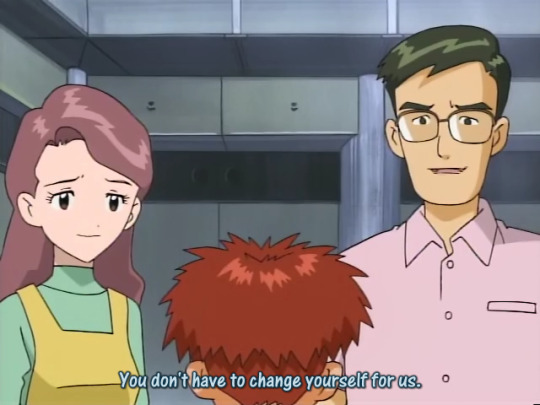
Adventure and 02 really make up an unusual series in many ways, and I think one of them is how kind it is to the human condition. One of its most consistent commitments is to portraying its kids as “real children” -- as in, messy kids with some very deep nuances to their behavior, in ways that don’t reflect what you’d usually expect from media tropes. In some ways, it ended up backfiring (tropes are not inherently a bad thing, and it’s led to miscommunication that persists to this day because the audience has to fight a tendency to read the characters through the kinds of tropes we’re all expecting to find), but it also had the effect that these kids could be intimately relatable to the audience in ways that “textbook” portrayals of kids often wouldn’t be.
Adventure had eight main characters in its human cast, which was extended to twelve in 02 -- a massive balancing act -- and yet took the stance that none of these twelve characters’ very different ways of thinking or living life are fundamentally wrong. Rather, it celebrates the differences between them, and encourages them to embrace them about themselves. But it also does not shy away from the struggles those with each line of thinking might have in terms of communicating and interacting with the world. It’s easy to say words like “be yourself”, but what does “be yourself” really mean?
“Each character’s way of thinking”
Most people tend to define “character development” by “how much the character changed over the course of the narrative”, but if you look carefully, not all of the characters change that much. In fact, Koushirou and Miyako’s character arcs are about how they shouldn’t have to change much about themselves!
What we do get to see, however, is everyone’s intimate thought processes. We’re given so much information about each kid’s background and how it shapes their ways of thinking, and how they react to given situations, that you can get six fanfiction writers who have studied the series well and give them a completely hypothetical situation with some of the characters, and most if not all of them will roughly agree, because each kid’s thought pattern is so well detailed that you can easily imagine how they’d behave even when the scenario is hypothetical.
This, despite the fact that Adventure and 02 rarely use internal monologue (this is something specific to its Japanese version; while Japanese anime generally has less of this compared to Western shows, Adventure and 02 are unusually low on this even compared to later Digimon series, and it’s a possible byproduct of the narrative being eventually revealed to be from Takeru’s perspective and not someone truly omniscient). This is something that also somewhat backfired in that characters who are difficult to read or unaware of their own feelings become very difficult for the audience to read, so you have to read their behavior patterns and put two and two together (such as Takeru outright lying about his feelings regarding his childhood in Adventure episode 12, or Sora’s testimony about her confrontation with her mother not quite tracking with what’s actually depicted in Adventure episode 26). It does, however, have a very powerful weapon that it uses to help the audience understand each character’s mentalities and what they’re thinking at a given moment...
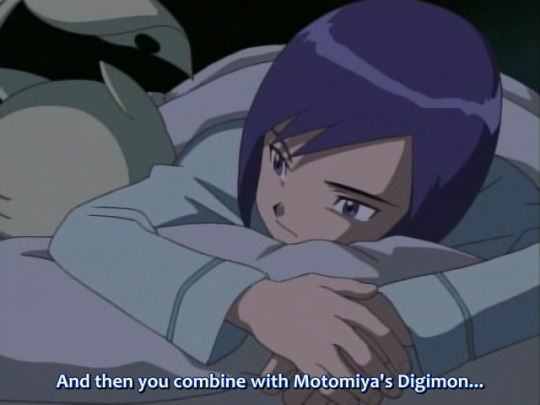
Digimon partners! In a sense, “talking with a Digimon partner” is a replacement for internal monologue, because the kids spill their internal feelings to their partners as if they’re talking to themselves. (Protip for all of you fanfic writers out there who struggle to figure out how to integrate the Digimon smoothly into the narrative: “cutting out most of your internal monologue and replacing it with a conversation with a Digimon partner” is one of your most reliable fallbacks.) This is helpful for characters like Koushirou, who initially starts off Adventure as very isolated from the others but immediately takes well to Tentomon, and Ken, who spends a good part of 02′s third quarter still very emotionally distant from the others and not entirely willing to open up to them, but very conversely willing to open up to his own partner. Iori converses about his conflicted feelings regarding the situation with Upamon during the process of forming his Jogress relationship with Takeru, and, back in Adventure, Takeru himself was willing to show his more “less well-behaved” side in front of Patamon that he normally wouldn’t when he was constantly in the presence of elders.
On top of that, Digimon partners being reflective of the kids’ own personalities in some sense means that they are very good at asking just the right questions at the right time, or saying perfectly well-timed things that the kids needed to hear the most, to get them to reconsider their position or realize that they might be going in the wrong direction...
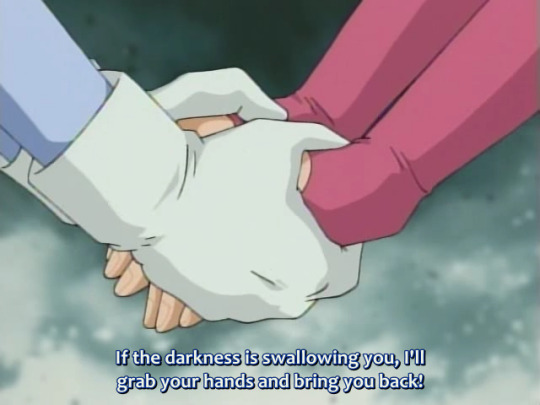
Moreover, we get a lot of help in 02 simply by virtue of the fact it’s about relationships -- I’ve said this a few times before, but 02 is not a series about platitudes or toxic positivity, and has a strong emphasis on “you must understand the other person’s feelings if you want to truly reach out to them.” Showering happy platitudes about friendship on them means nothing if you’re still technically dismissing their feelings and making zero attempt to figure out why they feel this way! Therefore, everyone only accepts Ken when they each come to understand his feelings on the situation, and the Jogress arcs involve the relevant parties making active attempts to “understand the other person’s feelings” and what exactly makes them behave the way they do, before addressing their problems using what they need most at that moment. Being able to push people forward in a positive direction requires having a proper understanding of all of the negativity that came with it, accepting them in spite of that, and choosing to address what they need.
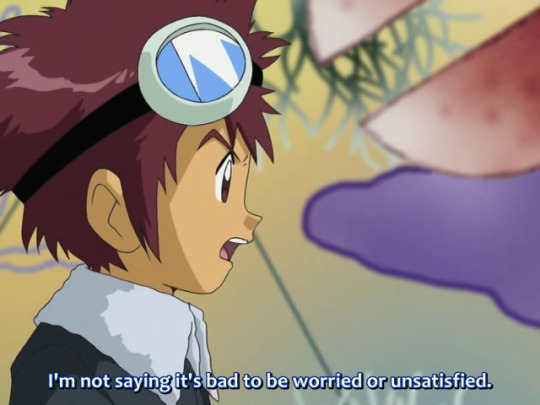
And in 02 episode 49, Daisuke says something that embodies a lot of Adventure and 02′s attitude towards these things: it’s not a sin to have feelings. Your reaction or way of seeing things, based on your backgrounds and experiences that have shaped you, is not something you can be blamed for having, whether that means being worried, sad, frustrated, angry, resentful, what have you. The only question is what you do in response to your feelings.
It’s easy to say “be yourself”, but that’s obviously a problem if you “be yourself” by rampantly ignoring what other people think and trampling on other people’s feelings, and it’s also a problem if “being yourself” is causing problems for others, and it’s especially a problem if “being yourself” is also hurting yourself while you’re at it -- so what does it mean to be true to yourself?
It’s not about your inherent personality traits, it’s about what you choose to do with them
As I said earlier, Adventure and 02 all arguably celebrate the fact that everyone is so different, and has their own skills to contribute to the group. Everyone has different strengths and weaknesses, and everyone makes up for each other’s weaknesses when they work together. And some of these characters do change in order to become “better people”. But what does being a “better person” mean? How does that tie into still “being true to yourself”, and yet changing at the same time?
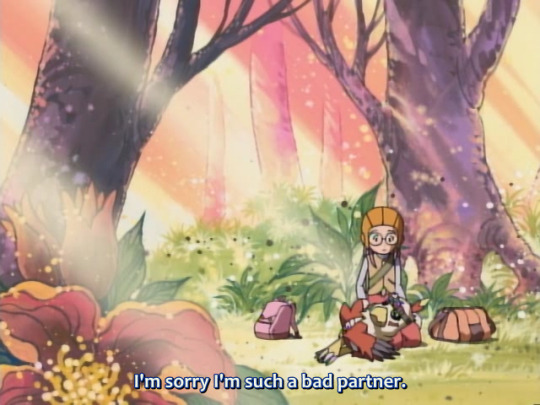
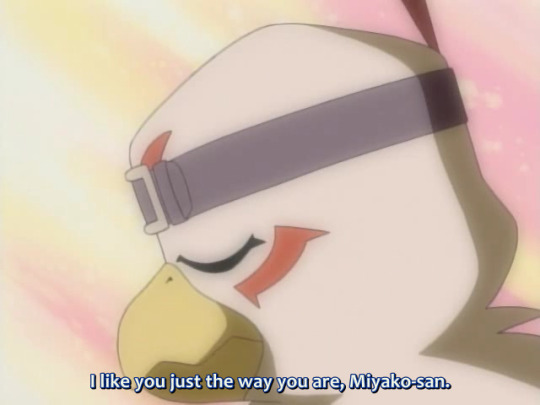
02 episode 18 has Miyako in possibly one of her worst bouts of loss of control -- she has an effective panic attack and starts yelling at everyone in all directions, resulting in Hawkmon getting hurt. However, everyone here understands that Miyako meant well and was trying her best given the situation, and nobody scorns her for it, with Hikari even arranging for Miyako and Hawkmon to have proper space to emotionally air things out. Again: it was not a sin for Miyako to have feelings of anxiety, but it was a problem once those feelings led to causing trouble for others -- as in, trampling on their feelings, not having enough regard for their welfare, and such. Well-intentioned or not, Miyako just caused problems, and for that, Miyako labels herself as a “bad” person (tying into her ongoing character arc that involved negatively comparing herself to more mature and put-together people). However, Hawkmon assures her that he likes her the way she is.
But Miyako can’t keep going on like this -- it would obviously be very bad for her to keep being inconsiderate and trample on others’ feelings! But what does happen is that Miyako simply learns to channel these traits in the correct direction -- it’s established that, on the flip side, her being over-the-top brings joy to other people by making them laugh (02 episodes 31, 36, 38), and her aggressive personality is able to reach out to those like Hikari who are too closed in and on another unhealthy extreme! And as it turns out, she is capable of channeling all of those “aggressive” qualities into “aggressively”...reaching out to others and proactively supporting them; all she needed was a bit better sense of regulation so that her energy would go to the places she wanted them to be, rather than rampantly all over the place to the point of causing trouble. She didn’t have to fundamentally change herself into someone like Mimi or Hikari; it was just about adjusting her way of going about things just enough so that she could become more considerate.
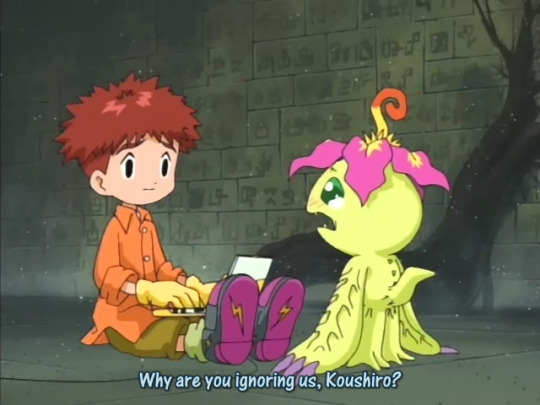
Even all the way back in Adventure episode 10, all of the “problems” caused in this episode specifically have to do with Koushirou ending up (accidentally) being inconsiderate to Mimi and Palmon and not taking their feelings enough into account. Again, Koushirou is not treated as if his feelings are wrong or malicious -- he even states that he thinks that the research he’s doing will help everyone in the long run -- but his way of handling this situation is awful, and, regardless of his intent, Mimi and Palmon are feeling abandoned and tossed aside.
For the rest of the series, Koushirou learns to hone his existing skills in analysis -- even his fixation tendencies are treated as a potentially valuable trait -- and, once we learn the details about how he started keeping distance from everyone due to the shock of learning he was adopted and his social anxiety tendencies in Adventure episode 38, Koushirou momentarily tries to force himself to use casual language, and his parents assure him that he doesn’t have to force himself to change. In the end, it’s not an inherent sin for Koushirou to have social anxiety, nor that he needs more time to adjust to becoming more casual with others -- according to Adventure episode 54, he does want to get closer to others eventually, but even Tentomon says he shouldn’t force himself. Koushirou “working past” his social issues doesn’t mean he suddenly has to turn himself into a socialite overnight, but rather, he simply needs to do enough to be able to communicate with others without (accidentally or otherwise) ignoring others’ important feelings. Thus, in 02, he’s still working on becoming less distant from everyone, but he’s managed to become someone who can communicate with and organize people, and is well-respected for it.
A recurring theme in Adventure and 02 is that there’s a good and a bad side to everything, and so if we look at the twelve kids over Adventure and 02, we can see that a lot of the “good things” and “bad things” about them really stem from the same thing:
Taichi: Being an ambitious person who can oversee people in disparate places and bring them together (good) also means that he’s not always good at checking the nuances or other potentially negative contingencies, and can be rather insensitive (bad)
Yamato: Being emotionally sensitive to others means he can be passionate and open about everything, and compassionate to others (good), but also means he can get explosively angry and lose control of himself (bad)
Sora: Being caring towards others and supportive (good) means that she can also end up developing self-destructive tendencies due to her perceived obligations to others (bad)
Koushirou: Being constantly curious and fixated on learning more means he can get to the bottom of things and answer questions that others can’t (good) but also means he can get too absorbed in it and not be able to take others into account (bad)
Mimi: Being extremely sensitive and empathetic means that she’s open-minded, compassionate, and all-loving (good) but also that she takes any kind of discomfort or emotionally draining thing extra hard, and may all too often be unable to take a stand even when she really should (bad)
Jou: Being constantly invested in everyone’s welfare and compelled to help them means he’s very honest and dutiful and otherwise reliable (good) but also means he can make very reckless decisions because he’s so stressed about everyone and everything (bad)
Takeru: Being good at maintaining an atmosphere of moderation and generally being able to handle very tough things means that he has a very strong grip on himself and doesn’t cause trouble for others easily (good) but also means he’s prone to sudden and irrational emotional outbursts because he’s suppressing so badly that he gets no catharsis and isn’t being honest about his own feelings (bad)
Hikari: Being compassionate and all-loving means that she can put her foot down easily for the sake of others and advocate for kindness (good) but also means that her desire to not be a burden on others makes her compulsively unable to vocalize any of her own personal problems to the point of self-destruction and passiveness (bad)
Daisuke: Being so deferential to others and pure-hearted means that he can focus practically on what needs to be done and be a supportive person to others (good) but also means that he’s prone to insecurity, defensiveness, and lack of assertiveness in the face of others (bad)
Miyako: Being over-the-top and full of bright energy means that she can bring joy to others and can reach out to those who have troubles (good) but also means that she has difficulty having restraint from losing control of herself (bad)
Iori: Being humble and a principled person means that he’s good at approaching things directly and driven by a constant desire to do good (good) but also can be so fixated on those principles that he clings onto them even far beyond practicality, and is constantly restraining himself more than should be necessary (bad)
Ken: Being assertive and able to have firm will means that he can get what he wants done for others and show kindness when he needs to (good) but also means that the same assertiveness can be used for uncontrolled sadism and inflicting pain on others (bad)
So, again: all of these characters are encouraged to embrace all of the good things about themselves, and to channel them in ways that are productive or healthy or help them live happily alongside others; all of those “bad” traits also being there doesn’t necessarily mean they have to blot out those personality aspects that have good sides to them as well! It’s just that those “bad” things need to be kept in check so that they don’t cause trouble, and you can read all of these character arcs in ways that involve everyone changing just enough to make sure those “bad” things don’t go rampant and cause problems everywhere -- and everyone’s an imperfect human being, so it’s unlikely that they’ve completely gotten rid of those entirely even into adulthood -- but they have better awareness of what they need to do, and how to better adjust themselves into better people.
Look at the difference between Ken and Daisuke -- Ken had to go through some massive changes because, as the Kaiser, his “bad” traits were going over the top and causing all sorts of harm to everyone, and there was a huge journey he had to go through to get that all in check, whereas Daisuke was always clearly a very pure-hearted person from the get-go and didn’t have to adjust himself as much. Yet you could say the same thing about both of them -- by Ken learning that his efforts and assertiveness were misplaced, and by Daisuke getting around his constant insecurity and need for validation in order to better lead everyone forward, they basically did the same thing, just in different ways, and they’re both better people for it.
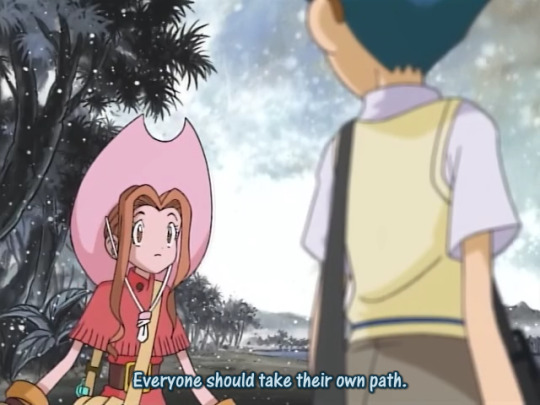
And it’s also the philosophy Jou endorses in Adventure episode 50 -- Mimi and Jou aren’t people who are necessarily best at fighting, and this isn’t inherently a sin. It’s just that they need to find ways to productively play to their own strengths in ways that are true to themselves. If Mimi can’t bring herself to engage in direct violence, she can at least use her skills to bring together everyone else who wants to protect the Digital World and prevent more casualties, and if Jou is, by his own admission, “not strong”, he can consider a path ahead of him that involves becoming a healer who can help those who are wounded, and prevent casualties that way.
There is no one right way to live.
What it is you want to do
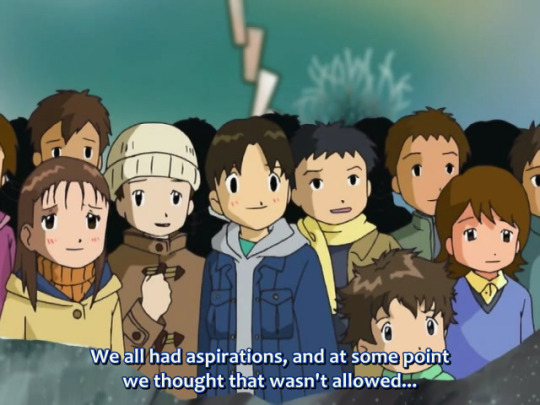
Here’s an interesting question about the 02 epilogue, and, while we’re at it, 02 episode 50 as a whole: Why are “careers” brought up so much? Timeskip epilogues are hardly new to 02 (and of course have popped up in media for years thereafter), but not all of them involve careers, and even fewer of them have that much focus on shoving “careers” into your face as the main centerpoint, especially since usually this kind of thing would be about family lives or romance or something (and we can say a lot about how the 02 epilogue cared so much about the career thing that it was blatantly prioritizing it over the hot-topic romance issue of Yamato and Sora).
Because, in the end, a career -- or, perhaps, a “future aspiration”, because various details about how the epilogue is presented indicate that “the career that defines your income and adult life” may not actually be the correct term here -- is the ultimate manifestation of “what it is you want to do with your life”. The point driven home by 02 episode 50 is that such a thing should be “what you want to do”, and, given that this was originally supposed to be the Adventure ending before 02 was conceived, it also ties into Adventure’s own theme of “finding your own path”. All of those “careers” listed in the 02 epilogue feel a lot more nonsensical when you think about it in terms of the material hobbies they had during the series, but make significantly more sense when you frame it in terms of what kind of personality each person had and what they would prioritize. Materially, if you think about what Taichi had as a “hobby” during Adventure and 02, it would be soccer, but when you think about him being “an ambitious, wide-reaching leader who brings people from different places together”, his career of “diplomat to bring two worlds together” makes much more sense. It wasn’t about what they’re doing to pay the bills; it’s about “what’s most important in each of their lives”.
And, as far as the series is concerned, none of these decisions are the “wrong” ones; if there’s a “wrong” decision, it’s the one 02 (and later Kizuna) warned you about, in terms of blotting your own self out and making yourself unhappy because you did it for the sake of society’s expectations instead of for yourself. There’s even a difference between the Adventure group and 02 group in their own priorities, in that the former is more individualistic and far-reaching in terms of personal ambition, and the latter prioritizes mutual support and living simpler lives as long as it makes them happy, and as far as Adventure and 02 are concerned, that’s all fine, because those are choices that suit their own dispositions and fit things that they want to do first and foremost.
Everyone is different, everyone has different priorities, and everyone has different ways to live. Everyone has different perspectives and feelings, and once the arguments are ironed out, those should be cherished and celebrated.
127 notes
·
View notes
Text
how are we doing? have the tears dried yet? I know mine haven’t ::
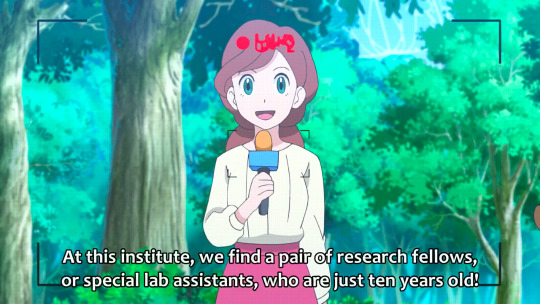
let’s start light : research fellows count ! (also, lady, only ten years old? - I resent that).
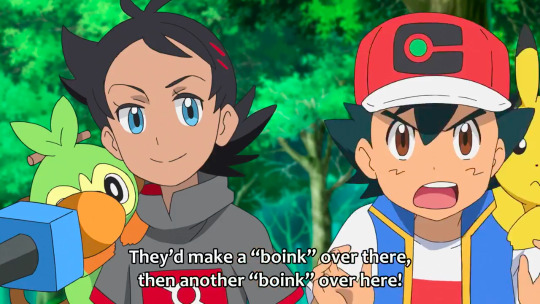
Goh understands this?? he’s got a silly proud smile and it’s following Ash’s butchered storytelling??? love
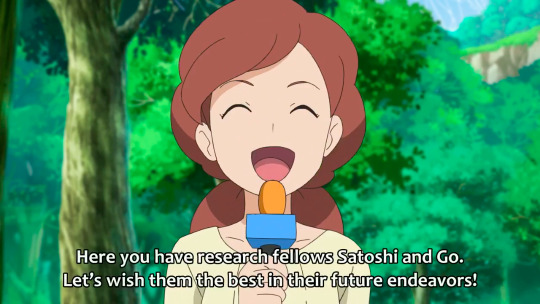
research fellows count !
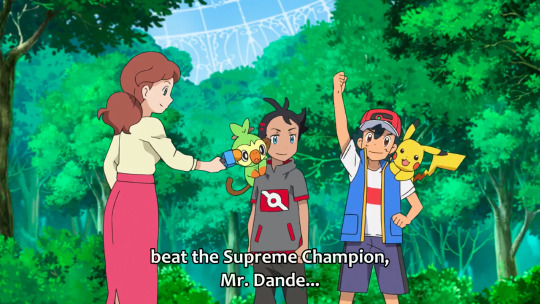
perfectly attainable dream
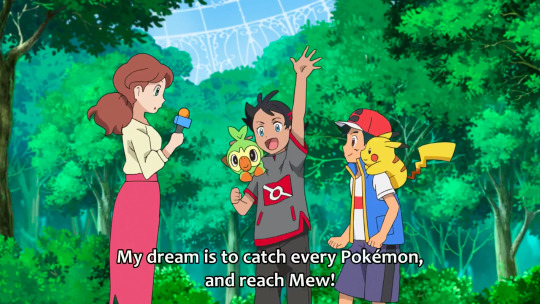
sure, go for it. (look at both of their supportive lil smiles, we love best friends)
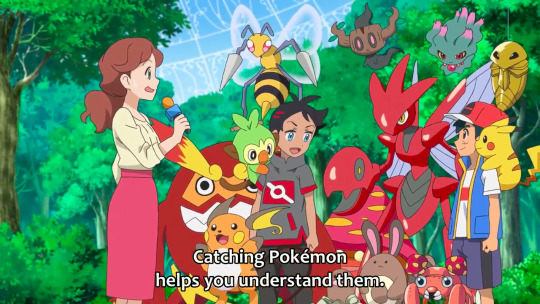
we all know the scene that’s coming ahead, but I thought this was a beautiful demonstration of growth already on Goh’s side.
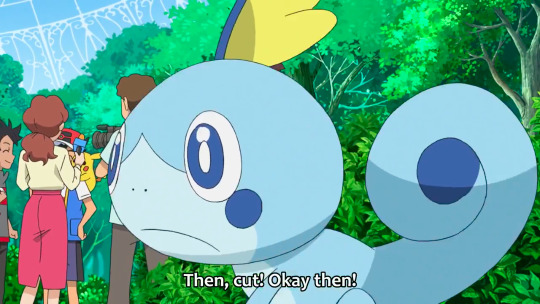
Listen before the sad part begins let us appreciate for a moment how Ash and Goh were smiling at EACH OTHER after the interview was over. cuties.
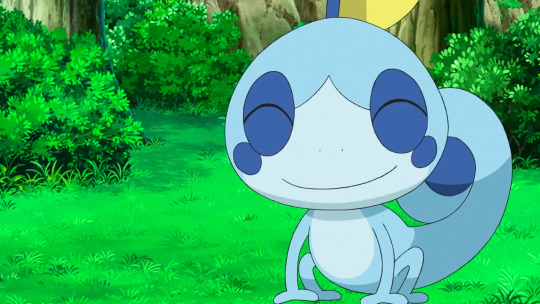
behold : the last frame we have of baby Sobble. I’m going to miss you, bean. thank you for everything<3 (he was so proud of his good deed as well!! my very heart)
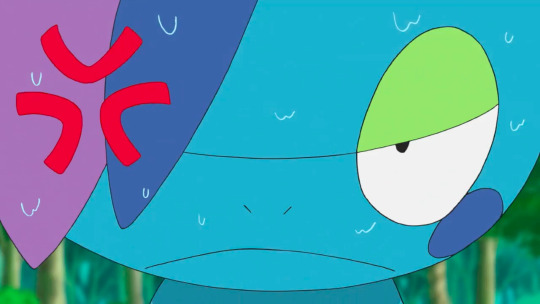
just how fast the night changes, indeed.
Drizzle went through shock and pain at record speed and swiftly landed on anger - only to fall into ✨depression✨ just as quickly.
and then we just stayed there.
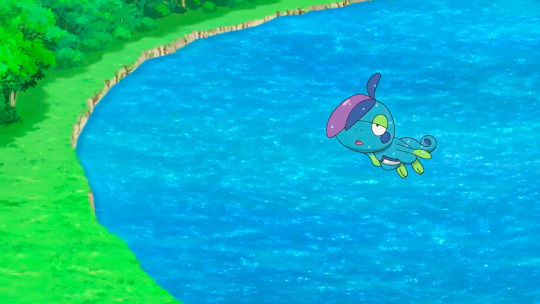
someone
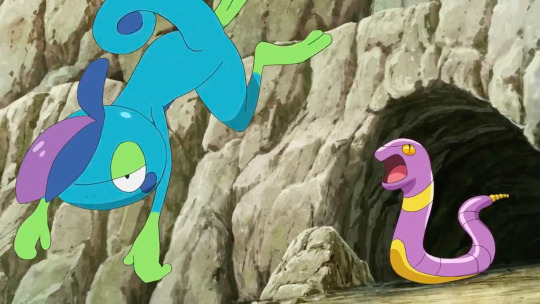
is
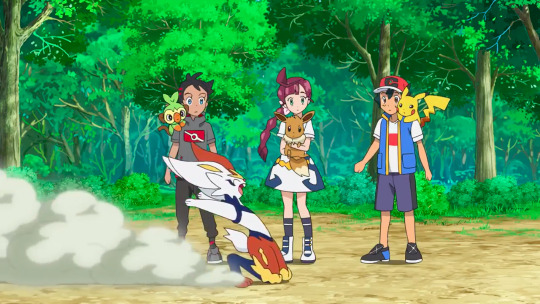
(oh hey Cinderace ! good to see ya)
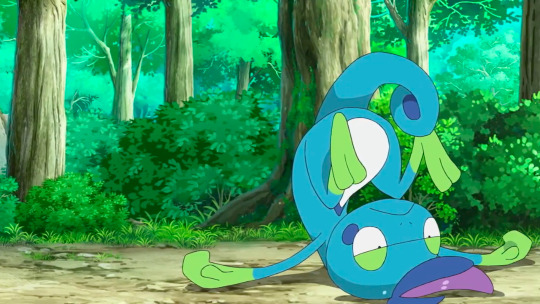
having
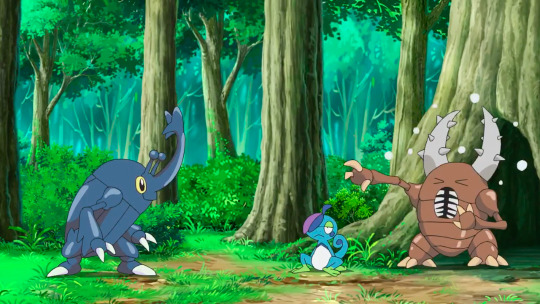
a rough morning
(I’m sorry, this scene was just fucking funny - the drama)
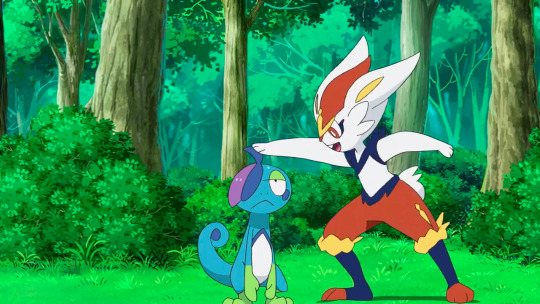
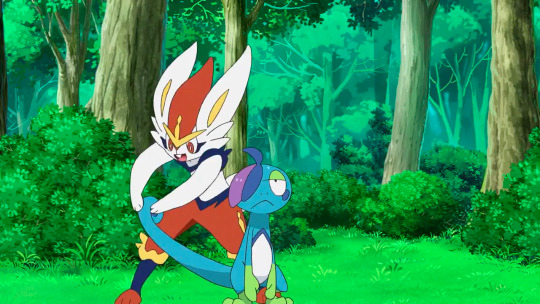
Cinderace’s proud big bro moment was just too sweet to leave out - let us not forget, he’s been a big bro since he was Raboot (and even as a temperamental Raboot, he was always gentle to Sobble). And now his baby bro has evolved as well. precious !
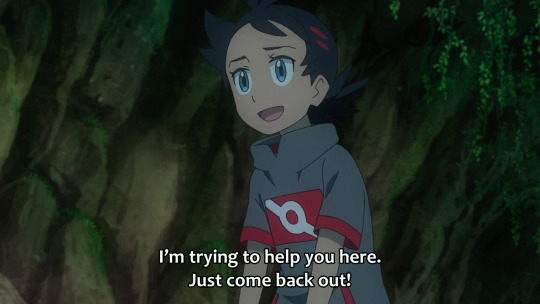
Goh handled this situation very maturely from the beginning. And here’s when the build up starts. He’s saying ‘hey, let me help you how I think you need to be helped” and he genuinely doesn’t mean any harm! naturally, his reaction is to help his Pokémon, in the way that has worked in the past.
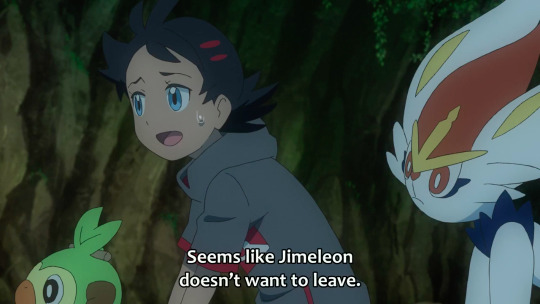
but then he starts to understand maybe that’s not the best approach this time around.
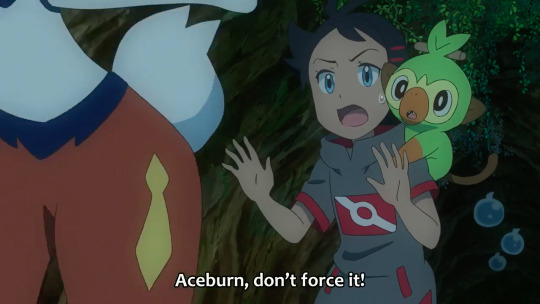
and he’s ready to respect those new boundaries (of course, there’s no blame on Cinderace, either. Much like Goh, he - and everyone, really - was just trying to help in the way he thought was the best).
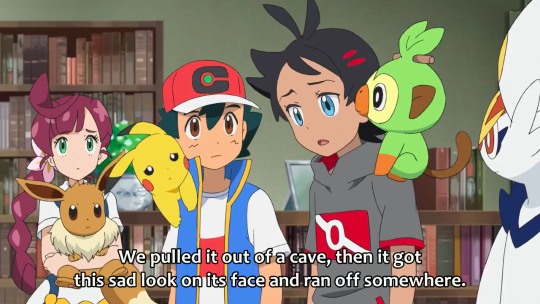
shoutout to the animation on this bit because Pikachu’s ears darting down was a delightful detail. Chloe’s expression and Grookey’s simmering down drove the point home as well.
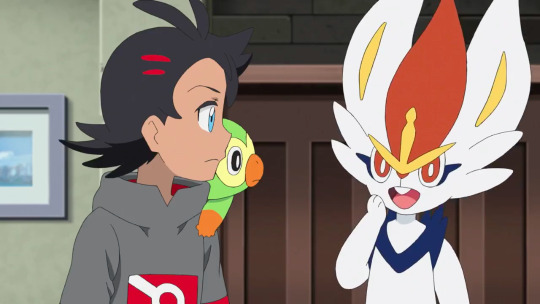
ah, you coy little thing. Did you forget how your trainer almost left you behind because of how rebellious you were??? Because you made him feel as though you’d be better off without him?? (Cinderace has selective memory, you can’t change my mind, don’t be miss-leaded by the cuteness)
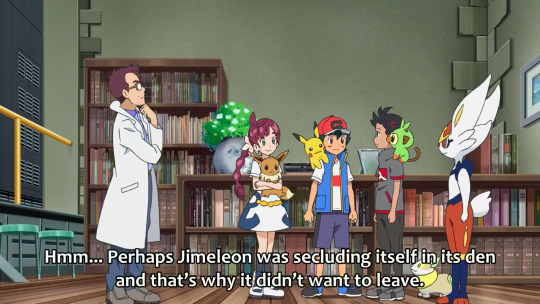
this build up was wonderful - we begin to hear all these reasons why, yeah? maybe he just wants to be alone.
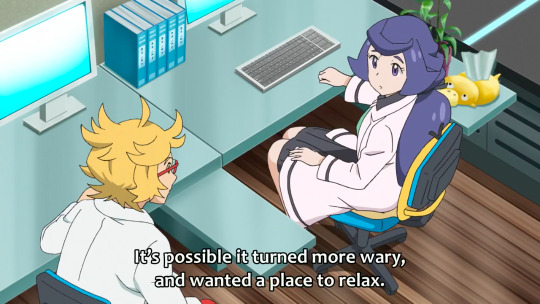
maybe he’s still very afraid and careful of his surroundings, and his evolution made it worse? (he’d been popping up in random places in previous episodes, hiding, which was also great foreshadowing for this episode !)
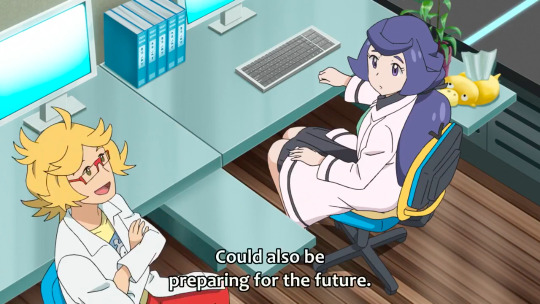
maybe he’s cocooning himself until he’s ready to evolve again? (which, considering his disappointment and how badly he wanted to be Inteleon already, is a very plausible reason)
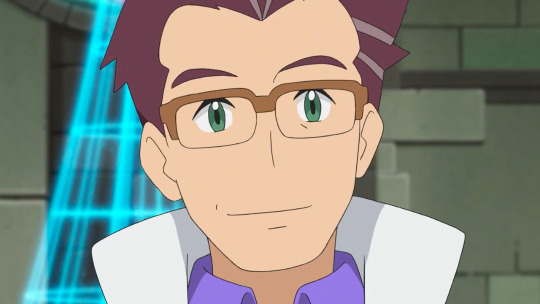
but Prof. Cerise gets it right when he says ‘we can’t really know for sure’ (which ties greatly with Goh’s upcoming scene) - is it your Drizzle’s quirk? are they all like this? who cares? Isn’t wonderful how he’s a living creature? how he’s got nuances and a personality? shouldn’t that be enough of a reason to look after him, and try to help him right now?
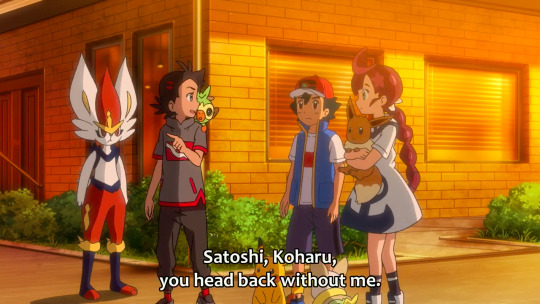
my child, still thinking he’s got to do everything on his own.
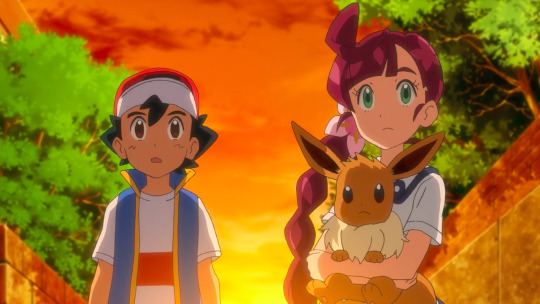
and these two are just like ????? Goh ??? watchu talking about ???
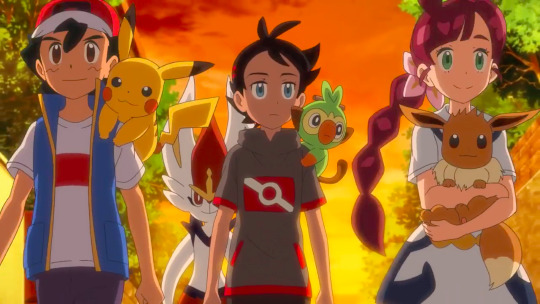
can you imagine how MUCH this moment means to him?? he was ready to keep going alone (it’s what he knows) and even when Ash and Chloe prove him, time and time again, that he’s not alone, there’s still something in Goh coded to believe others won’t care as much/won’t be there when he needs them. and that’s why he insists: I’ve got this. I can do it alone.
and, sure, but you don’t have to. that’s the beauty of friendship.
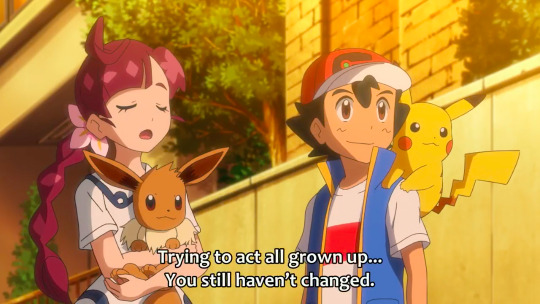
you tell him, Chloe. (actually, without Chloe calling him out, he might have taken longer to figure out where Drizzle was. so...) // but also, it gives us a glimpse into the fact that, while Goh might have felt very lonely, Chloe has been observing and caring for him - in her way - for a long minute as well.
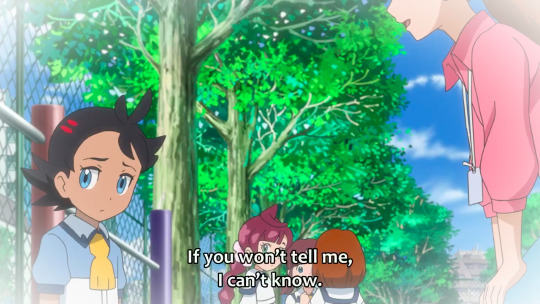
my very point above.
HEY, LISTEN: he doesn’t know, either. he’s a child, words are hard, and you rotate along the four moods of childhood (happy, upset, scared, hungry (?)) and don’t ponder much on anything else because you are a child, there’s no emotional intelligence to speak of, no need for it, you’re being shaped by your environment and all the stimuli of the world being a new place. things like loneliness, confusion, anxiety... we can’t put those into words - hell, they’re fucking abstract and confusing even when we are adults.
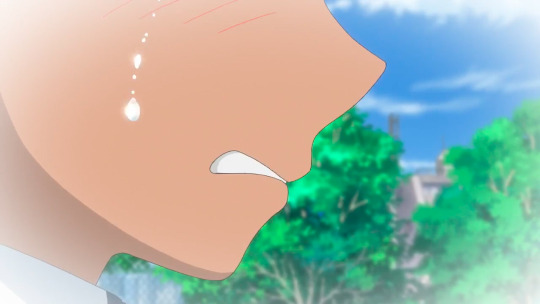
and Goh’s stimuli and environment was, given what we know of his family life, a rather lonely one. Did his parents have a lot of spare time to take him to the park? I don’t think so. Was he good at going out there and asking other kids to play? ... probably not.
Chloe doesn’t strike me as an extrovert, either, so even if she wanted to get close to Goh or invite him to hang out, perhaps she was too shy as well. Heck, perhaps Goh’s reaction would’ve been like the one above, he simply didn’t know. Maybe he didn’t want to ! and that’s perfectly fine as well.
am I forgiving the anipoke team for making Goh cry? no, never. but this was beautifully executed so I can grow to live with it.
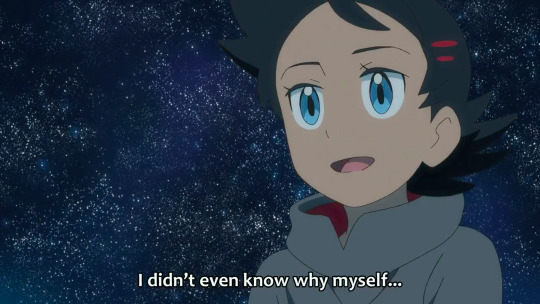
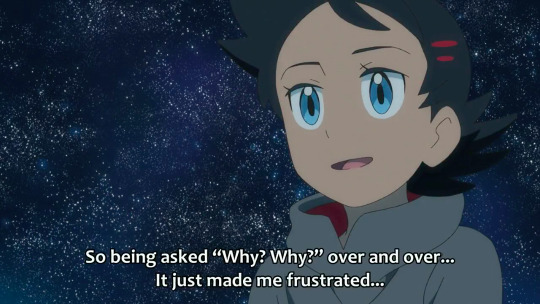
“why are you depressed?” “you have nothing to be sad about!” “look at all the wonderful things you have!” “just be happy again!” - sound familiar? yeah, this was incredibly well done.
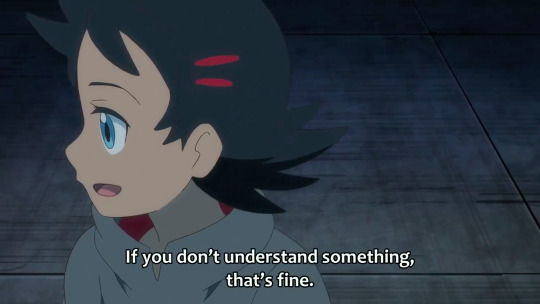
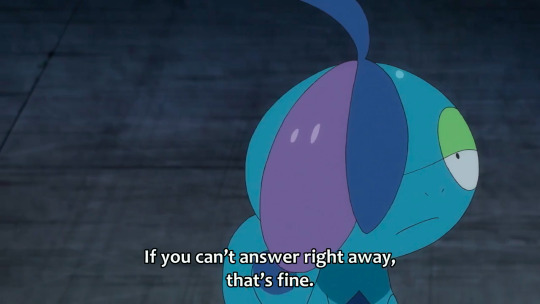
as adults, perhaps we see this and think ‘shit, how cool that they’re prodding on these topics, it’s important’ and it is !!! so important !! but if it’s this impactful as young-adults/grown-ups, imagine how impactful it must be as a child to see this and feel perceived. I’m honestly so proud of this moment, this whole episode. I’m grateful they took the time to look into this maturely. and even if children don’t do a full-fledged analysis on it, if they relate (like I know so many of us did) they won’t forget it. and that’s beautiful.
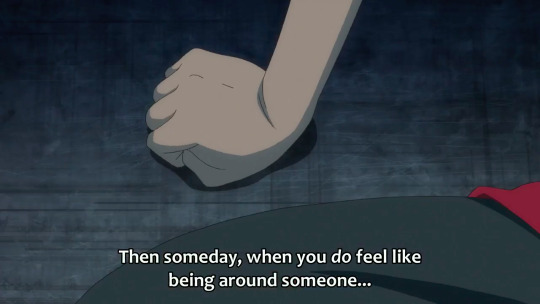
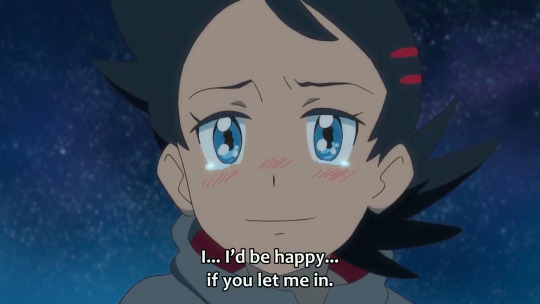
darling I’m blanking on your TW handle I’m so sorry - but someone in a tweet SO RIGHTFULLY pointed out that these are the words Goh would have needed to hear when he was younger. saying them to Drizzle it’s a full circle moment for him, he’s hearing them as well, and it’s helping both of them grow.
He’s not forcing himself as Drizzle’s trainer. Goh bears no entitlement here. He’s saying ‘Hey, if you’re comfortable, if you want to share , I’ll be here’ / as a kid, people did care for him, they kept wanting to know what was going on, but Goh couldn’t put that in words and people pestering him only made it worse, but if someone had said ‘hey, when you’re ready...’ then,,,,yeah,,,,maybe it would’ve been different.
he’s offering that safety now to his Pokémon, something he didn’t have, but he grew to understand is what he (and now Drizzle) needed. If that doesn’t have you breaking down in a teary mess then you are stronger than I’ll ever be, because my glasses were cloudy by this point.
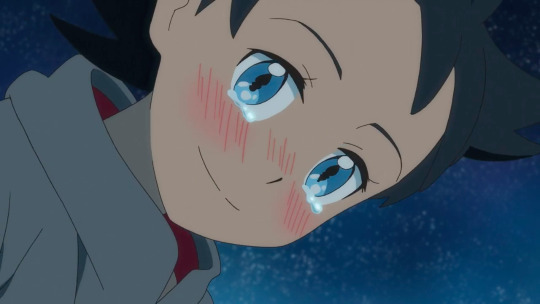
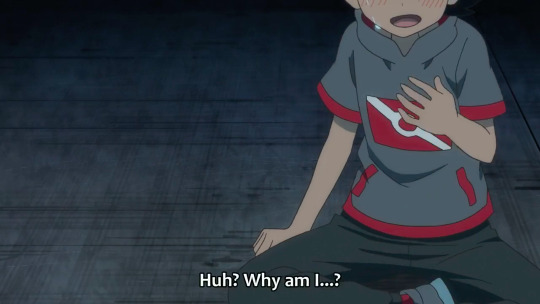
why, why, why. because you needed to hear all that as well, baby! so did a number of us. thank you.
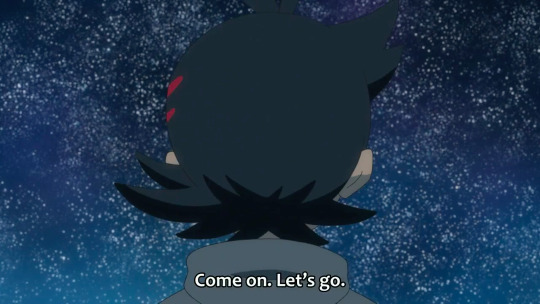
I’ll say that, however it was that you connected with this moment, that’s yours to cherish.
Personally, I too had a lonely childhood marked by parents who overworked, and I too spent a lot of time alone in kindergarten and through elementary school because it was hard to make friends (turns out i’m an extrovert, ha, talk about breaking out of your shell...) so, obviously there were easy common grounds for me in this episode.
but I LOVED to read the reactions and realize so many people still connected with it, one way or the other. So many of us felt seen and understood and acknowledged in emotions that are so hard to put into words !!
so, again, if you identified with Goh or Drizzle or any of the topics in this episode, that’s very beautiful, and I hope the underlying message that you’re not alone gets through.
With Sobble, and now with Drizzle as well, Goh is very adamant to remind us that, however we are, that’s fine. there’s something that makes us special, regardless of other people’s opinions, or their ideas of how we *should be* // that’s the message I’m taking with me, at least.
and i can’t wait to see how this story line evolves !! I have no doubts that, when the moment comes, Inteleon will be a wonderful addition to the team, but Drizzle is here now, and he’s plenty wonderful already x
Bonus:
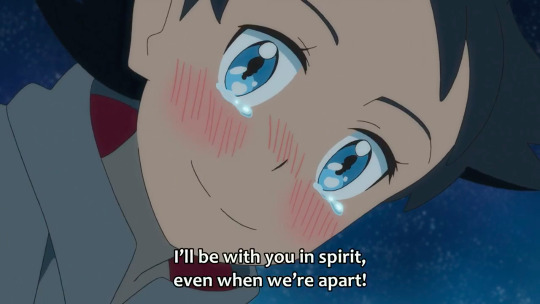
ha ha, yes. I watched this episode three times. And all three times I was a mess.
side note but a very important one: the animation, the voice acting, the dialog, the scenery of the starry night - the entire scene was so beautifully executed. so carefully crafted. ugh, amazing. just perfect. so happy.
#all right this took forever#if you are still reading thank you#anipoke#pokemon journeys#ep 62#we won't be forgetting this one now will we#journeyshipping#Pokémon Journeys: The Series#SatoGou#Firstfriendshipping#Goh#satoshi#Chloe#ngl Chloe was the mvp#calling Goh out on his bs#we love to see her#Goh I'm so proud of you#please keep growing#you're beautiful and i love you
96 notes
·
View notes
Text
John Walker, Token White Guy
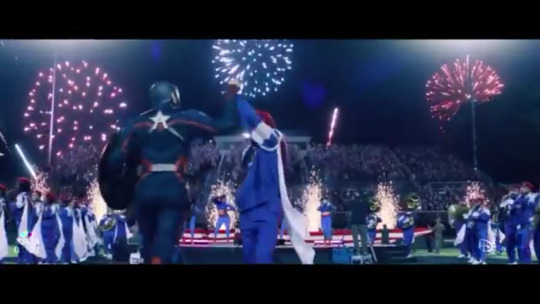
The second episode of TFATWS told us a lot about John Walker, more so than some in the audience picked up on. Looking at him at his old high school, I realized I was looking at a Token White Guy. My respect for the writers ratcheted up. I knew they were going to be dealing with some of the complexities of racial inequality in America, but I never expected this level of nuance.
Full disclosure, my husband and I have lived for over 50 years in the rural South, and we have -- seen a lot of the public school system. Anytime you're a white person in a majority black area, you're going to spend some time as the Token White Guy. For a mature adult, this can be an awkward responsibility. But for a child in an almost all black school system, things can get -- weird.
Both the public and the majority of the school faculty and staff judge schools by the percentage of white to black students. This is racist, but it happens. Actually improving the quality of the school's instruction takes a lot of work. It's much easier for majority black schools to appear to improve their school by putting the handful of white kids out front. And everyone is going to be glad to see them up front, because they're improving the school's reputation just by being there.
Far too many teachers have some level of bias against black students and in favor of white students. So the white boy in a class full of black students is going to be expected to succeed while his classmates will expected to fail. Expectations influence performance, especially in children.
Now most children naturally want to cooperate and do well. But for the Token White Kid, everything he's good at is going to be celebrated far more than the other kids are celebrated for what they do well. His prowess will be held up so that it can demonstrate that their school is a good school IN SPITE OF being majority black.
There's usually only one area that he's actually good at, but somehow he's going to end up with good grades in nearly everything else anyway. You saw Walker's discomfort when the interviewer brought up his grades -- he knew at some level that not all of them had been earned.
And let me emphasize this -- everyone thinks this arrangement is a good thing. It benefits the school by improving their reputation the easy way, which in turn is seen by the staff, parents, and the kids as a good thing that everyone benefits from.
And the students usually feel a great harmony with each other. When the Token White Child grows up in that school, he or she often gets along really well with the other students, because he or she is seen as improving their lives just by being there. The Token White Child will often vigorously defend his or her classmates from children from other schools, and his or her classmates will just as vigorously defend the Token White Child from any adults who might cause them trouble.
But what does it do to the child growing up as the Token White Child? Around 10-12 the more sensitive children start getting very uncomfortable with the situation. They realize that they are being seen -- and used -- more as a symbol than as a real person with their own opinions on matters. They may withdraw from the things they have previously loved doing when they see how adults are manipulating what they love to do in ways that they may not be comfortable with.
But the less sensitive Token White Child never realizes what's going on over his or her head.
The other deficit is that the Token White Guy is not necessarily taught how to be an ally. It's often thought that they are doing enough by being the white face of a largely black organization. Far too often no one asks them to level up for fear that they'll leave, so they never learn how to help with the nuances.
We see all of this reflected in John Walker. He's not that uncomfortable with being chosen to be a symbol because he's been treated as a symbol all his life; carrying the shield seems to him a higher version of something he's already done. He's very comfortable with black people, but at the same time he's used to them being grateful to him for just showing up. He doesn't know how to handle Sam's silent disdain. He does Sam and Bucky a favor by getting them out of trouble with the authorities and expects them to fawn over him because that's the sort of thing that happened when he was a kid growing up. When they refuse, he lashes out at them because he can't understand why something that's always worked for him before isn't working this time.
While John Walker is not consciously racist, he's the literal embodiment of white privilege. And while not every Token White Child is going to grow up as clueless as he has, it's fascinating to see such a well-rounded character in the MCU.
54 notes
·
View notes
Note
I am chickened out from gladiator because it is this long and it keeps getting longer is it worth my time to read it ??
... Uh, well. I can’t help but wonder if you’re aware this blog is run by the actual author of the story in question? I don’t know if you expect me to give you a non-biased answer when I’ve considered the story was worth 8 years of my life xD as far as I’m concerned, it absolutely has been worth it, but I can’t speak for the whole wide world when it comes to that. If you want the opinions of readers, there’s probably other blogs run by people who have read the story and who might have critical opinions about it... that may be what you were looking for. If, however, you were deliberately hoping to get my opinion on my own story... well, yes, for me it’s clearly worth it xD Otherwise, I would’ve quit ages ago.
The story is indeed very long and it keeps getting longer, and it will keep getting longer because we’re not done yet and won’t be for a while :’D if you’re the type of reader who can’t stand it when they catch up to stories and have to wait for updates, well, feel free to give it a shot when I’m done writing it, I guess? It’ll be a while until then, but it’s up to you. If you don’t like reading really long stories, then it’s probably better for you if you don’t force yourself to read this one, I know not everyone is ready to dedicate that much time to reading something, especially if they have lots of things to do. Hence, if the length daunts you, that’s alright, it daunts me too and I’m responsible for it xD it’s fine if that deters you from reading it.
But as the way you phrased your question almost sounded like you’re challenging me to give you some sort of sales pitch to catch your attention, let’s see if I can pull it off:
Gladiator is a massive ATLA AU, not only in terms of story length but also scope: it’s a complete rewrite of the entirety of ATLA in a more mature setting, starting chapter 1 with the characters 5 years older than they were in canon. Aang’s adventures in saving the world did not take place here because of a simple enough reason: Katara didn’t accompany Sokka on his boat on the fateful day when they were meant to find Aang, which means the story as we’ve known it simply doesn’t take place. I’ve taken liberties here and there, added some changes from canon when I needed to do so, in order to ensure the story works, but the gist of the story is to set a stage where the Fire Nation marched onwards, practically unopposed, and conquered the Earth Kingdom with the power of Sozin’s Comet (just in case it needs to be clarified, without certain technological developments, Ozai’s wild plan to incinerate the whole world wouldn’t happen, and if Team Avatar isn’t assembled before the Comet shows up, said technological developments simply wouldn’t exist... :’D). I’ve had to figure out how many details would change, how much of the original story would or wouldn’t happen without Team Avatar’s involvement, I think most my choices have been solid, but it’ll be up to you to decide if you think they are or not if you read the story.
The worldbuilding of Gladiator, then, is preeeetty huge and complicated because of that starting point. There’s a lot of elements that are completely new (such as the Gladiator League and all its derivates), some OCs, some lore expansion, so you can definitely say it’s an ambitious project. In a sense, I’ve reset canon to zero, and at the same time I haven’t, which makes things complicated but, for me, really fun to develop. If you’re interested in seeing more of the Avatarverse explored, characters repurposed, with new dynamics and relationships, Gladiator may just be what you’ve been looking for :D
In my experience, the main reason why most people stumble into this fic (other than by sorting FF.net’s ATLA stories by review count and drawing blanks upon glimpsing a Sokkla story on the first page xD) is because they’ve been drawn into Sokkla, or they’re looking for stories centered around Azula or Sokka. Gladiator, evidently, features all three such elements because, obviously, those two are the protagonists and their relationship is the beating heart of the whole tale. I’ve been asked in the past who’s the real protagonist and I honestly still have no idea xD but anyways, if you’re interested in reading a story with a toooooon of Azula character development, even if it takes place across a long, long time, this story may just do the trick. I’ve done the best I could to keep her character as true to what I believed a young adult Azula might become, within the circumstances of this story. She has grown a LOT in 200 chapters, goes without saying (if she hadn’t, I’d be one heck of a failure of an author x’D), so if you’re interested in seeing a slow but effective growth arc for Azula, you’ll certainly find that in Gladiator. Same is true for Sokka, but I think most people who come to this fic for Sokka are interested in seeing him being a badass, which we have plenty of as well xD still, it’s also a long and slow process for Sokka to grow into a powerful warrior, neither him nor Azula start out in the story with all the answers, and they both bump into many hurdles as they navigate their complicated lives.
There’s a lot of humor in Gladiator, perhaps more than expected with a story that has that sort of dark premise, but it’s, on great measure, because Sokka and Azula are inevitably given to banter xD if you want to read a lot of banter between those two, well, you may not be bored in 200 chapters because, while the nature of their exchanges does vary as they both develop, their conversations are usually pretty spirited and they love trying to outsmart each other all the time.
If you are already a Sokkla shipper and the main reason you’re here is because you want more Sokkla goodness in your life... I’ll just say Gladiator has become a bit of a dream come true for me as a Sokkla shipper as well, because it’s the perfect space for me to work with virtually every idea I’ve ever had for these two. Yes, there’s drama and conflict here and there, if you’re not too given to angst there’s a few parts of the story that won’t sit so well with you, though if you love angst you’ll probably enjoy them plenty... yet what I’m most proud of, with this story, is having developed their relationship not only as best I could, but I’ve also attempted to defy typical storytelling structures for romance stories, where the lead couple can’t seem to have a stable relationship because “that would be boring”. Screw that, man: these two have been in a serious relationship together in-story by now for well over half the published chapters, and I’ve had the time of my life writing their dynamics as a couple while the plot continues to develop around them. This, however, is not everyone’s cup of tea, so if you aren’t all that given to seeing such traditional romance storytelling structures dismissed because I wanted to write my favorite ship dealing with all their external struggles while finding strength in the bond they share, Gladiator may not hold your attention long enough for you to devote yourself to reading it beyond chapter 100-ish. On the other hand, if this subversion of romance structure is what you’ve been looking for all your life, or if it’s what you always wanted and never knew you wanted it, or if you’re simply curious as to whether it works or not, Gladiator may suit your interests fairly well. Again, Sokkla is the absolute center of this story, both together and independently, so if you want to see a rewrite of ATLA with them at the core of just... everything? xD that’s absolutely what you’ll find here.
That being said, there’s things I guess you should mind about Gladiator: I have some relatively controversial takes about certain things, including interpretations of fan-favorite characters that some people have been known to take offense over. I, personally, believe my interpretations of those characters don’t deviate that much from canon or that, when they do, the setting itself explains why the deviation works as it does, but due to the fact that I work with a protagonist who was in a villainous role back in ATLA, her relationships with some characters can be more complicated than a lot of people seem to believe they should be. Hence, if you’re not particularly adverse to reading content that brings up big questions about the motivations of certain characters, or how they’d react if the story from ATLA hadn’t happened exactly as it did, you’ll have enough fun in Gladiator. If, however, you don’t particularly care to see anything that shows beloved characters in a not-so-flattering light, this story may not be for you (though, if you’re willing to humor me and allow my story to question your perception of those characters, feel free to try the story as well).
There’s also a variety of dark themes and situations in Gladiator, something that any reader should be warned about in this day and age: I am 100% against violence for the sake of violence, to name one such subject, and I generally try to portray it with as much nuance as possible, but even if I feature my own characters criticizing their violent world and wanting to put an end to the strife caused by the Fire Nation, some of the violence in Gladiator may be a little too much for the readers who prefer the tone of the original ATLA. Hence, if that’s how it is for you, it’s another reason to approach the story with caution. I won’t pretend I’ve handled every theme and subject perfectly, but I’ve never wanted the darker moments to feel gratuitous in any way, so if you’re open to reading a darker take on the Avatarverse, this may work for you after all.
Alas! If you want to see Azula growing out of the toxic Fire Nation indoctrination, if you want to see Sokka gaining confidence and strength as a man and warrior, if you want to see a fleshed-out but still very much villainous Ozai, if you want to see Toph fulfilling her dreams of joining an all-out fighting league where she can beat people up for a living, if you want to see a myriad of secondary ATLA characters (like Song, or Shoji!) given new lives and even genuine protagonism, if you want to see Zuko discovering he’s allowed to just... be happy? xD Gladiator may prove interesting enough for you.
Furthermore, if you want to see Azula being true friends with Mai and Ty Lee, discovering a dragon, developing new firebending styles, confronting her misplaced beliefs about herself, rebelling subtly (and lately, not so subtly) against her father, growing into a great leader who could change the Fire Nation’s nefarious direction... aaand if you want to see Sokka fighting creatively (sometimes with TWO swords!), navigating the dangerous waters of interacting with Fire Lord Ozai, staying true to his beliefs while also learning that the world is not as black-and-white as he was raised to think it was, understanding himself better and making the most of his potential as a quick learner, writing embarrassing haiku and being an unapologetic rebel who goes toe-to-toe with Heads of State just because he can... yep. Probably read it? xD
Lastly... if you want to see Sokka and Azula grow through their mistakes, learning to understand each other, fighting side by side, training together, dancing to no music, learning the underrated pleasure of proper communication in a relationship, sassing each other left and right, flirting in ridiculous ways, taunting each other in many regards, laughing at each other’s terrible jokes, protecting each other fiercely, challenging each other to a spicy ramen eating contest, discovering indirect bending, being highly inappropriate at times and places where they shouldn’t be, making long, dangerous yet fun journeys together, sneaking around to meet up when they’re not supposed to, standing by each other in their darkest moments, watching over the other when they’re sick/injured, being ready to sacrifice virtually anything for each other, and even defying and defeating even death to save each other...? Well, I don’t know if there’s any other stories where you might find all of this, but I can guarantee you’ll find it in Gladiator :)
If none of this is convincing enough... that’s a shame, but I understand. If it convinced you to give it a shot, however... I guess I’ll just hope you enjoy it enough to stick around! :) thanks for taking my story into consideration regardless of whatever you decide. Have a nice day!
18 notes
·
View notes
Text
help I had some thoughts
she-ra is kind of a unique show. I struggle to think of anything else meant to appeal to that wide an age range: there are toddlers enjoying this show! I think that’s pretty cool, but I also think that it causes some tension in how we (as adults, or older teenagers) interpret the show. let me explain what I mean.
some things in the show are clearly there because it’s a kid’s show. would an adult version of she-ra have swift wind the rainbow talking comic relief unicorn? no. (and it’s probably why a lot of us don’t particularly care for him.) on the other end of the spectrum, we have things like the show’s depiction of abuse, which it handles in a nuanced and mature fashion. the tension happens when we get to the bits in between. let’s take the invasion of salineas in season four as an example.
what do we think of when we see that last shot of salineas in flames? death. genocide. the horrors of war. but that’s not what actually happens in the show. all we see are burning buildings, and then in the next episode civilians being rescued and taken to safety. duh: this is a kid’s show! we can’t show everyone dying. but the thing is, we have to accept that as true. for the emotional narrative to make sense, we have to believe that no one was actually hurt in that attack. think about how mermista reacts in the next episode: with bubble baths and ice cream. it’s even played for comedy at times. that’s not the reaction of someone whose home has just been wiped off the face of the earth, whose people have been decimated. instead, the show takes the opportunity to show a character exercising self-care and bouncing back when she’s ready.
and that’s the thing: she-ra is not a show about war. it’s not a show about genocide or imperialism. those elements are all present, and they’ve all been explored very well in fanfiction, but they’re not the fundamental themes. instead, moreso than any other show I can think of, it’s about characters and interpersonal relationships. those things are explored in all sorts of ways, including, symbolically, through acts of war that, in an adult show, would have much deeper and darker implications. it can do that because, in a world where no one ever dies, where magic exists, it’s never in doubt that salineas will be back, good as new, by the end of the show.
this isn’t an indictment. it’s not a bad thing. it’s just different, and people who grew up watching atla and lok (both shows that are aimed at older viewers than the lower end of she-ra’s range) might not be used to it. atla and lok do handle a lot of dark material very well. she-ra takes the opposite approach: almost everything is in service to character, to relationships, the salvageable and the unsalvageable. the darkest parts of the show are, consistently, shadow weaver’s manipulations of the main cast. what she-ra does, it does extremely well, and what it doesn’t do isn’t a failing but a choice.
this is why we can so easily forgive scorpia, even though she’s complicit in everything the horde has done. this is why we can forgive entrapta, even though she spends most of the show literally inventing more and more destructive weapons. this is why we can forgive glimmer, even though in season four her arc is about trying to set off a weapon of mass destruction. and this is why we’ll be able to forgive catra. don’t expect her to account for her “war crimes” (and please, I beg you, don’t throw that term around). she won’t, because that’s not how the show thinks. that’s not how its emotional narrative works. what she will do is mend the bridges she’s burnt. fix the relationships she’s discarded. outgrow the demons that chased her to rock bottom. and that will be enough.
I have every faith that season five is going to deliver on everything the previous seasons have promised, so long as we take it in good faith and don’t expect things the show simply isn’t designed to deliver.
214 notes
·
View notes
Text
Ben Solo - A Sad Star Wars Story
Warning: longer post. (And possibly, a few unpopular opinions.)
~~~~~~~~~~~~~~~~~~~~~~~~~~~~~~~~~~~~~~~~~~~~~~~~~~~
For a start: I’m not here to say I like how the sequels ended with Episode IX, in particular the way they handled their protagonist.
It sucked, to say the least.
I am writing this because looking back now, I can hardly imagine how the authors could have wrapped up the sequel trilogy with the happy ending we expected.
Let’s start with that word: happy. Honestly, did anyone want Ben to be “happy” with what Rey has become? I did expect her to fall down the rabbit hole. We repeatedly have witnessed how aggressive and judgmental she is; and by all logic, she had to meet her own Dark Side in order to realize that she has no right to judge the man she first knew as Kylo Ren. The moment I heard Palpatine’s evil laugh in the first trailer, I figured he had come to pursue Rey, not him. Unfortunately, her moment of shock was short and she hardly learned from it; if anything, since Luke sent her right back into the battle. This scene may have been what fanbros expected from Luke, but honestly, it was ridiculous. It did not fit to The Last Jedi’s Luke and it did not do Rey any favor.
And: had Ben emerged victoriously, found his happy ending, how would the title “The Rise of Skywalker” be justified? He is a Skywalker by blood, but in fact he is a Solo.
Wrapping Up the Saga
The sequels were received with mixed feelings from the start. Fans of old were angry at The Force Awakens since it seemed to say that history was repeating itself; that the heroes or the original trilogy had brought down the Empire but not managed to preserve peace. We saw them separated from one another as they once had been, disillusioned and worn out. Not the mention the wasp’s nest that was raised by The Last Jedi! If the Prequel Trilogy dismantled the illusion that the Jedi were perfect, the Sequel Trilogy definitively does the same with the Skywalker family. Both messages are clear for everyone to see, provided one is ready and willing to see them.
If Star Wars is a tale with a moral - and given its approach and the fact that it was handed over by Lucas to Disney of all studios it is - then the authors are trying since the 80ies to teach our minds to a compassionate approach on both villains and heroes. One of the main reasons why many fans dislike the prequels is that they expected to see the Jedi and Anakin / Vader being cool; they felt let down by witnessing the Jedi’s narrow-mindedness and Anakin’s strong emotionality. The affronted reactions to The Last Jedi were on the same line of thought. The prequels showed that the Jedi were not the good guys, and for the observant viewer this is already clear enough in the original trilogy. But it was only with The Last Jedi that the elephant in the room was finally approached.
Through Rey, The Rise of Skywalker makes clear that wanting to be a Jedi does not entail actual heroism but the conviction of being a hero. And Rey’s dyad in the Force, the tragic figure of Ben Solo, warns about the dangers coming from a child and teenager no one believed in as a person because everybody only saw his powerful potential.
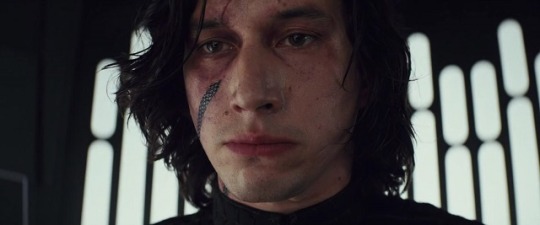
The Jedi’s Failure
Neither Luke nor Anakin nor Rey needed the Jedi in order to become heroes. They already were good-hearted, brave and idealistic when we first met them. The Jedi ways did not make any of them happy; they learned to use their powers and employed them for short-lived “victories”, but they never found lasting peace.
Not a few fans have wondered how Luke Skywalker, who believed in his father despite all, could give up on his nephew that fatal night (even if it was only a moment of panic). Simply put: as strong and mature as he is by the time of Return of the Jedi, Luke suffers from a father trauma, and he desperately wishes for Vader to become Anakin again, his father, who used to be a hero. When he asks Vader to leave and come with him, it is not out of pure idealism but also a personal request. But Luke did not need his nephew. The moment he had at the temple was a personal issue, it had little to do with Ben’s strength in the Force or his status as Luke’s model student: Luke was afraid that Ben would be the end of everything he loved. Luke, Leia and Han were thrown together by a trauma bonding; Ben had no place with them because he hadn’t been through the same.
The actual tragedy in Ben Solo’s life was the bitter realization, over and over, that he was not needed by anyone (except for being abused, e.g. by Snoke). Ben desired Rey even before he had met her because she was powerful but unexperienced, and he hoped to find sense and belonging by protecting and instructing her. No wonder Rey’s rejection in the Throne Room drove him out of his mind with rage: it was another confirmation of what he had experienced all his life - that people can do without him. So he decided, bitterly and sullenly, that he could do without others as well. But over and over, he had to realize that he could not escape his want for connection. He kept hunting for Rey; and he was very conflicted both when it came to his father and his uncle, letting on that he did have an emotional connection with both of them although he didn’t want to accept it.

Ben’s tragedy was that he did not want to be special at all, and that contrarily to his uncle and grandfather he was aware of it. Ben simply wanted to belong somewhere.
It is an intrinsic part of the saga that a hero is never a hero “because he is superior to others for… reasons”: Star Wars does not bow to that cliché. Some people are born with the capacity to tap into the Force, but not all of the saga’s heroes have it. The morally good qualities a person has, the right decisions they make are not inborn but passed on, learned, communicated. In A New Hope Luke was saved by Han, to whom he had offered companionship and set an example by trying to save Leia. In Return of the Jedi Vader was won over by his son’s loyalty and sacrifice. For an average action film hero, this kind of attitude or outcome of his adventures would be unacceptable: a hero is expected to be triumphant, not saved by someone else. And I know enough fans who don’t understand Luke and prefer Han or Vader to him, who are both cooler and more predictable.
In film, where characters need to be introduced to the audience within the scope of minutes, narratives are applied in a way that the general audience gets them quickly. The downside is that this goes at the expense of nuances. Fans don’t like to see Anakin being passionate and stormy because as Darth Vader he was coded as brutal but cool; they don’t get Obi-Wan’s many mistakes because he was coded as a hero, or Yoda’s arrogance due to his status as a wise old mentor. The sequels brought this dichotomy to a new level coding Rey as the heroine although she has a bad attitude and comes from bad blood, and Ben Solo as the villain when his attitude is conflicted at worst, and who is the offspring of the original story’s heroes. The difference lies in their intentions - hers are good, his are bad. This is interesting because it makes us, the audience, question ourselves as to how and why we believe we can tell good from evil.
You could probably say into a megaphone that the Jedi are not the good guys who always win, that the Force is not a superpower belonging only to the Jedi and that there is no simple Dark and Light but that the Force needs balance: some viewers will never get it. I guess everybody feels the saga’s subtext on a subconscious level; but woe betide if someone like Rian Johnson brings it up to the surface for everyone to see.
Narrative Key
One of the main reasons why The Last Jedi is so divisive is, I think, that its major theme connecting all of the others is communication. While the prequels told much about miscommunication or lack thereof, Episode VIII is packed full of beautiful examples of what happens when people actually manage to communicate; and even when they do not, they learn from their misunderstanding one another (e.g. Poe with Admiral Holdo).
It is a common but major mistake not to question the narrative key to a story. Many Star Wars fans believe the story is simply about the good guys defeating the bad guys, so they overlook the deeper themes of the saga and respond with outrage when the authors try to humanize their heroes, bringing them down from their alleged pedestal. It is e.g. helpful to know Joseph Campbell’s monomyth theory; to consider that a film saga is not the same as a TV show and that therefore if the characters go through changes these must be significant from one instalment to the next due to the time limitations; to watch a few films by Akira Kurosawa, in particular The Hidden Fortress, to understand the significance of a major event seen through different eyes; or consider the prequels’ parallels with legends, classic literature, or the Bible - Lucifer’s fall, Romeo and Juliet, the tales of King Arthur. Star Wars is a conglomeration of many narratives, from Western films to the Japanese to French fairy tales to Greek mythology to Shakespearean drama. Who approaches these films expecting mere “action” is bound to be disappointed. It is understandable, however, that if you are used to certain kinds of stories, you will assume that every story should basically follow the same lines, and you will have difficulties accepting anything that is different, or believe it’s just badly made.
I still remember the (sometimes vicious) quarrels I followed in an online forum a few years ago about a Japanese mecha anime who some fans by hook or crook wanted to fit into the structure of a French novel. Of course, those two narratives don’t fit together: no wonder most of the other fans didn’t accept that kind of interpretation.
The Phantom of the Opera’s film version of 2004 was largely a failure both with regard to quality and audience appreciation because it made a tacky Byronic romance of a story that actually is a mystery thriller, probably expecting that it would be more appealing that way. What the filmmakers accomplished was making the story flat and the characters annoying by stripping them of the drama behind the original story.
Filming Rebecca’s film version from 1940 Hitchcock managed the transition excellently maintaining the storyline of the original novel; but Daphne duMaurier’s book is a coming-of-age story, and who expects a crime thriller may feel irritated by the narrators’ meandering and detailed inner monologue.
Game of Thrones also could not culminate in “all’s well that ends well”. The last season was not well-made, but I think now that was not the whole reason behind the audience’s disappointment. The show always was very crude and included loads of horrific events; even the worst victims of the war, who seemed to have a justification for their actions and seemed well-meaning, at times did terrible things. It would be a misfit to apply a happy ending to a “sex and violence” narrative as with another martial epic, like Aeneid and Iliad. Who waits for happy endings ought to avoid this kind of story from the start. (Yes, I know, I should listen to my own advice - had I imagined how depressing Rogue One is, Star Wars fan or not, I would probably have skipped it.)
Stories of this kind can be dissatisfying because as an audience, we follow our heroes’ adventures, sometimes for years, and we usually want to see them to find their happiness in the end. But in all honesty: we should have imagined.
That is why I think it was naïve to believe that the sequel trilogy would lead Ben to a happy ending with Rey. I have read more than one fanfiction which irritated me at first, until I realized that they were told on the lines of Fifty Shades of Grey, or Pride and Prejudice. That may work well for a fanfiction, but Star Wars is not a mere romance. Even if there was a hint of the overture to Romeo and Juliet during the abduction: couples based on that trope are not destined to end well. I myself was hoping for a happy ending due to the fact that the saga’s rights were in the hands of Disney of all production companies; and giving that the Skywalker family is one of the most famous in pop culture, I was certain they wouldn’t wipe them out. However I was not quite sure how they would do that and make it convincing, and I was wary when it came to the assumption (which many Reylo’s took for granted) that the love between Rey and Ben would be strong enough to save the galaxy and give them a happy ever after.
When a guy is introduced by murdering a defenseless old man, letting an entire village be wiped out with practiced ease, going on with torturing another guy both physically and mentally and climaxing with the horrible crime of patricide, one can hardly expect a happy ever after for him; even less since so very little was explained in terms of his childhood and adolescence. Some viewers identified with Ben Solo and saw his abandonment and abuse issues; many others didn’t, and none of the sequel films really thematized them. That he made peace with his parents and died to save the girl he loved is sufficient for a convincing redemption arc, not to offer him a happy closure.
The Trope That Comes Closest
There were a lot of speculations with regard to the trope Ben (Kylo) and Rey were actually modelled on. Romeo and Juliet, Hades and Persephone, Pride and Prejudice or Beauty and the Beast, and there were probably more. Rian Johnson is known for loving The Phantom of the Opera more than any other musical. I don’t think that’s coincidental.
- The phantom is disfigured by birth, Ben is extremely powerful by birth; and Ben also gets disfigured by Rey during their duel. (Vader’s sunken, charred face under the mask was, for a long time, how I imagined the phantom unmasked by the way.)
- The phantom is highly intelligent and has huge musical talent. Ben was born with a strong power in the Force.
- Both wear masks and look much less threatening without them. They also wear a cloak, and black clothes.
- The phantom had committed terrible crimes both to protect himself and to punish a world which would not accept him. Sounds familiar?
- In the musical we do not get to know how he became a ruthless monster in the first place. Ditto.
- The phantom dies (or disappears, in the musical) because only the girl knew that he was lonely and unhappy and that he still had goodness inside him. She had forgiven him, but the rest of the world wouldn’t have believed her or forgiven him.
Both Kylo Ren and the Phantom are creatures who are at the same time terrible and wonderful. The normal world, populated by average people, cannot accept them because they are both too fascinating and too terrifying. In order to find lasting fulfilment, Ben ought to have found back to humanness. The phantom couldn’t due to his disfigurement and his criminal past; and though Ben loses the scar on his face, the Cain’s mark of the patricide he committed, his deed and his former status as Supreme Leader of the First Order never would have been forgotten.

“Yet in his eyes all the sadness of the world
Those pleading eyes that both threaten and adore…”
Christine in The Phantom of the Opera (on the rooftop)
Heroes: Dynamic and Static Characters
A general rule of storytelling is differentiating between dynamic and static (also called “impact”) characters. A static character is like an anchor for others: while they live through crises, learning and maturing, this character always remains his old self and always stands for the same values. He may be misunderstood, opposed and belittled, he may lose the battle, but never the war; and after having helped others through their troubles, he usually is on his own. (Cue: cowboy riding into the sunset.)
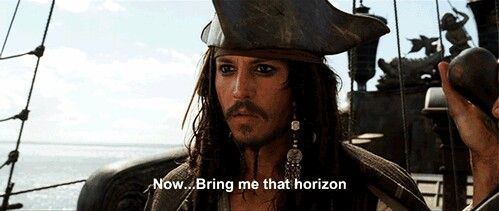
Superman stands for peace and justice, Jack Sparrow for freedom, Peter Pan for the innocence of childhood, Paddington for faith in people’s goodness. No wonder they are so popular: it is familiar and reassuring to follow the adventures of someone who is always like a rock in a storm. Static characters are in essence childlike, two-dimensional; which is probably why our child self easily gets attached to them and may be outraged at the idea of them changing, or maybe (gasp) being wrong about something.
But George Lucas developed his saga along the lines of personal growth, and by exploring its themes: thankfully, otherwise it would have become as boring and repetitive as so many other franchises. To continue a story you can either make it dynamic, or press the repeat button over and over. The Skywalker men with their strong emotionality may be unusual heroes, but much more interesting than other, “cooler” guys whose actions are more or less foreseeable. So, I can understand the Disney studio’s choices. On the other hand, it is not surprising when fans of old get angry when their supposedly unalterably perfect heroes make mistakes: everybody wants to know that some things (or persons) never change. Even if on the long run, change might be for the better.
I think one of the sequels’ most important messages was that the Skywalker-Organa-Solo family failed their heir precisely because their mindset did not change. Ben grew up in another world than they did; obsolete political structures, dictatorship or rebellions did not matter to him. But his family wanted him to adhere to the ideals that had gotten them through the war against the Empire, discouraging him from searching and finding his own place in the world, a world that now was very different both from the old Republic and the Empire.
Whether a static or dynamic character is more relatable to the audience is a personal matter. Many fans adore Darth Vader, Leia and Han Solo etc. precisely for the fact that basically they always remain their old selves. Padmé also is a favorite, probably due to the fact that she does not change considerably. Anakin changes a lot, which is perceived as a sign of weakness. Some fans may relate more to Luke, who undergoes serious trials and emerges from them stronger and wiser, far away from the greenhorn he was in A New Hope. And yet Luke’s final decision to throw his weapon away before Palpatine is often perceived as weird to this day. It’s not “heroic”.
The outraged fans who ranted at Luke’s portrayal in The Last Jedi did not realize that Luke was doing something both Obi-Wan and Yoda, or the other Jedi for that matter, never had done: he took responsibility for his actions. In this context Ben was the audience’s self-insert, he was as appalled at Luke’s misstep as we were. Such a blow is enough to send someone on a lonely island to meditate about his mistakes for years, convinced that the world is better without him.
But for the action film audience, that is not acceptable. If you have a light sabre and the Force (an alleged superpower), what do you need responsibility for? You can’t do wrong if you’re the hero, right? Luke also was the only character from the original trilogy who underwent character growth, which makes it all the more ironic that the many, many critics who tear the sequels to pieces are fuming at how Luke could be so “defiled”. Luke grew beyond the person he had been in A New Hope; these fans obviously did not. Which is why the studios thought they had to produce The Rise of Skywalker in order to “appease” them and to give them the Luke Skywalker they wanted.
Where Does the Galaxy Go From Here?
A conversation between my husband and me, about a year before The Rise of Skywalker came out.
Me: “I hope Ben Solo will survive at the end of the trilogy.”
Him: “I do hope that, too. But they won’t give him a happy ending.”
Me: “Why?”
Him: “He killed his own father.”
I hate to admit it, but he was right. I’m not aware what ethics code is under use in the film industry now, but in any case, the horrible crime of patricide was done; even if it was under coercion, the son traumatized by it, and it ultimately brought him back to redemption. You can’t make a patricide, the former right hand and for a time leader of a terrorist organization a hero and give him a happy ending; in particular when you are Disney of all film studios. (Not to mention that he killed Han Solo, a very popular character.) And from exchanges with other viewers I am aware that many do not understand how Ben killed Han under Snoke’s coercion, and the implications that led him to kill Snoke: they believe he simply did it because it’s something an evil, power-hungry person will do.
Ben dying without anyone knowing that he was not a villain at heart and worse, leaving the fates of the galaxy in the hands of a young woman whom we often saw giving in to evil influences again and again within the scope of minutes was a dangerous turn. If he was but “a child in a mask”, Rey is a child who believes to be a Jedi. How is Rey supposed to be a heroine, with the other half of her soul gone? She and Ben fitted together perfectly because she had the good intentions but a violent attitude, while his intentions were bad but his attitude desperately conflicted because inherently good. Rey came from evil blood but was kind-hearted because she believed in her parent’s love. Ben was the heir of a family of heroes but did not feel loved by them, which made him lonely and bitter. What good is Rey on her own, even more so when at the end of Episode IX she deliberately leaves her friends and goes to a literal desert? The little girl inside of her is still starving for connection, and neither being a Jedi nor a “Skywalker” will appease her. She had to meet Luke to realize that he was a good man but still just a man; a lesson she didn’t quite internalize yet. The sequel trilogy wasn’t her story because her personality hardly developed. It was Ben who went through hell and back.
Films (and film sagas) have a determined length and as a film studio you need time to explore all themes, which in Star Wars are quite complex. The worst mistake I found with Episode IX was that it broke the Campbellian monomyth in favor of a Marvel type B-movie to appease the fans of old who had hated The Last Jedi. Which is understandable from their point of view, but went at the expense of quality. The Rise of Skywalker may have quenched the fire a little, but as a film, it’s frankly forgettable, and compared to the other films from the saga, I doubt that it will age well. Had the sequel trilogy continued Rian Johnson’s approach instead of putting a band-aid on The Last Jedi, it would have been good enough to make a cultural impact the way the classics did. If the sequel trilogy was meant to follow The Hero’s Journey, no one completed it: Ben died and Rey went into exile, and no one brought any kind of elixir or salvation into the world.
All of this is not to say that I have grown to like The Rise of Skywalker and that I am not disappointed about the ending, or no longer sad about Ben Solo’s death. I hope that the next trilogy will give him a second chance: I am still convinced that his ultimate fate should have been to bring lasting Balance to the Force. If I am wrong and his existence practically cancelled the past without improving anything, the whole saga loses its sense. I think that by now he atoned more than enough for his sins.
When I learned that Rian Johnson had negotiated his own trilogy after The Last Jedi, I remember wondering what it would be about. After all, almost everything had been said about the Skywalker saga, hadn’t it?
It hadn’t. I had naively assumed that like with Episodes III and VI, the final revelations were preserved for Episode IX. By now it seems to me like The Rise of Skywalker is meant as an appetizer for the next sequel. It can’t be that the studios unlearned how to make good films in so short a time after The Force Awakens and The Last Jedi, also considering that everything else they made about Star Wars in between (Rogue One, Solo, The Mandalorian) is solid work and not by a long shot as flat as Episode IX.
The studios assuredly will keep their secrets as long as they can. The Mandalorian was met with huge expectations, yet nobody knew about Baby Yoda before the first episode was aired. Due to their depth and love for details, Star Wars films can be watched and discussed over and over, and the message regarding the necessity of Balance is still widely unknown or not accepted by the fans. If this is supposed to be not only an entertaining but also an educational tale, authors must give new fans room to get to know the saga, and old fans time to let the new ideas sink in. Lucas and his collaborators have taken decades trying to teach us that morals are not black and white. But still when The Last Jedi came out, the message was utterly hated.
Whatever Johnson’s trilogy will be about, it can’t be a part of the Skywalker saga any more: they are all dead. Even if Ben is brought back somehow, he is a Solo, so this time it would be the story of his own family. The Skywalker saga was basically Anakin’s, and by reconciling with a Palpatine and giving his life to save the woman he loved his grandson ultimately made up for his sins. The Last Jedi was a bold move; but what are “bold moves” supposed to be good for if they are not followed through? Apart from the fact that the sequels weren’t even exactly bold but drawing sums from what we already could see in original trilogy and prequels about the Jedi and the old Republic.
Family Is the Key
Star Wars is a family tale. It is for families and it is about families. One of the most frustrating things about The Rise of Skywalker was, for me, that the “new” heroes didn’t make any kind of home or family of their own; and a Star Wars film or series never works without a father figure at its heart. I am sure Ben Solo was ultimately meant to be a father figure; the sequels couldn’t work without even giving him the chance to be one. Anakin and Luke both founded a family - one through marriage, the other befriending many different people. The third generation did not even get a chance either way.
“I believe that you are redeemed by your children.” George Lucas
In Star Wars, children always have to pay for their parent’s sins, and only they can make them atone. Which makes it all the more tragic that Ben is not a father; by this logic, only his child could have saved him, or an adopted one. On seeing the enslaved children of Canto Bight, of whom one is Force-sensitive, I was convinced that the sequels would be the children’s trilogy. (I might have accepted Ben dying had he saved and left them with Rey, who also is an abandoned child and so would have found a meaningful task.)
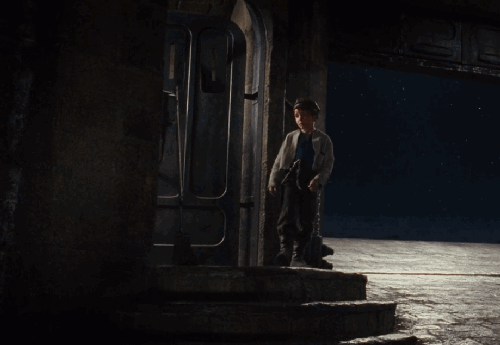
What the galaxy needs most are not heroes but people. Heroes exist to save desperate situations; lasting peace can only be made by normal people. With Luke becoming a hero in the original trilogy and Anakin a villain in the prequels, I was expecting Ben to find back to humanness. Since we have another trilogy to look forward to, I do still hope Ben will get another chance and this time he will find his happiness; but I also believe that he will have a long way to go before that. By the end of The Rise of Skywalker he is a hero, but in order to be happy he would need to learn how to be fully human, realigning both sides of his personality and healing the gap between them (the way Anakin couldn’t). And you don’t learn how to embrace your humanness quickly after having lost it within the scope of years and years. Ben wanted Rey because she was the only person in the galaxy with whom he could be completely honest. But being human also entails bonding with other people, not only with one’s significant other.
Ben tried to pull off the “bad guy” role and failed because it’s not in his nature. A lot of fans see him as a loser, because whether good or evil, a male protagonist is supposed to be always unfazed. The gentle, nurturing and emphatic personality that comes out in Ben when he is balanced is not that of a warmonger but of a peacekeeper: I see nothing inacceptable or emasculating in that. Unfortunately, who has Luke, Anakin or Han as blueprints for “real” men, won’t accept someone like Ben Solo. I hope that in time, he will be more appreciated, and that his life story will be a warning both for the audience and for the saga itself, i.e. that it is more to the point not to punish a criminal but to prevent him from becoming that way in the first place. Which brings us again to the topic of children and a better way to raise them, Force-sensitive or not.
Rey and Ben both are children with unhealed wounds. Their brief moment of harmony during the Force connection on Ahch-To was so powerful because both were speaking to each other’s inner child: Ben saying to Rey that she was not alone, Rey offering Ben an understanding he had not known before. Padmé also always saw in Anakin the good little boy she had first met; one of the reasons of the unbalance in their relationship was that he felt powerless to do something for her in return.
I think that the sequel trilogy of the Skywalkers wanted to tell us is that even if you save the whole galaxy, it’s not sufficient if afterwards you can’t support and protect your own offspring. When we met Han, Leia and Luke again, their personalities were pretty much as we left them; their mistake in handling Ben can’t have been something they actually did to him, the blunder must lie somewhere in their attitude. All three of them were traumatized by cruelly losing or never having known a healthy family life, so we must assume that after the war against the Empire, they tried to build a new world that would fit to their needs. But if adults build a home, they must do so thinking first and foremost not of themselves but of the ones who need it more than them. Children shape the future, not a victory of “good” over “evil”. And I find it interesting that the codebreaker DJ, who had such a pragmatic view of war, was also someone we met on Canto Bight, like the children. He was a traitor, but as everyone in the saga, even he had a point when he said that ultimately, wars are useless because they always flare up again.
“Good, bad, made-up words. You blow them up today, they blow you up tomorrow.” DJ in The Last Jedi
The last scene of The Last Jedi showed us a Force-sensitive boy sweeping an open space before looking up at the sky and dreaming about being a Jedi. I still believe that this scene’s meaning was “Clear the stage, it’s time for us - the children.”
The Jedi, respectively Force-sensitive creatures, must find new and better ways if they want to be advocates for peace and justice. No institution can claim to have a moral standard if it does not protect, nurture and encourage their most vulnerable and needful members, i.e. the children. Watching the prequels it is shocking to follow how the intelligent, brave and affectionate child Anakin could become the most hated man in the galaxy, crushed in the powerplay between the “good but narrow-minded guys” and the “bad but not always wrong” guys. Both his and his grandson’s dark fate could have been avoided, had it not been for the Jedi mentality based upon the conviction of having the right to destroy everything that does not (or does not seem) to line up with them.
The Star Wars saga told us over and over that power is not what it takes. The Jedi lost the Clone Wars; Vader was a lonely, bitter guy (not to mention Palpatine); Kylo had all the power his grandfather never had and it did him no good. Anakin, Han and Ben all were loved most by their women when they were at their weakest. And this brings me back to what I stated above: stories can be interpreted in different ways, but what about the message the author actually wanted to convey? If I am not getting it all wrong, it’s that compassion and not power is the key to everything good.
Episode VII and IX mirror one another, only VIII hints at a possible balance. Star Wars has a cyclical narrative; Anakin / Vader had his happiest moments and successes in his youth, while his grandson in his own youth hit rock bottom and committed his worst sins. If Kylo Ren’s destiny, as per Adam Driver’s words, is supposed to be the opposite of Darth Vader’s, how can The Rise of Skywalker really be the ultimate ending for him?
P.S. What do you think, could baby Yoda and Ben meet? Then Obi-Wan and Yoda would be together again in a new way.
P.P.S I would also like to see the Force, for once. I’m sure it’s not black and white at all. How about a rainbow? (Does anyone have Rian Johnson’s e-mail…? 😊)
P. P.P.S. On the other hand, if the next film starts with Rey being pregnant and not knowing how, I might be sick… ☹
#star wars#star wars sequels#ben solo#kylo ren#bendemption#savebensolo#reylo#rey#rey palpatine#luke skywalker#han solo#leia organa#anakin skywalker#darth vader#disney lucasfilm#the force awakens#the last jedi#the rise of skywalker#the phantom of the opera#read more#narrative technique#obi-wan kenobi#yoda#baby yoda#canto bight#padmé amidala#george lucas#sw
89 notes
·
View notes
Text
So the majority of the shows I’ve seen lately can be charitably described as ‘light entertainment’, including the ones with dark elements or more weighty, ponderous plots. They might be entertaining or interesting, they just... don’t stand up to scrutiny. Turn your brain off because this isn’t that carefully or skilfully made and you’ll only be annoyed if you start thinking about it as a whole. Including the last couple 'tragic’ historical dramas I’ve watched, which were not effective tragedy for that very reason. If you’re going to kill off the main cast, you have to earn it, and overwhelmingly writers don’t. Anyway, I’ve been getting despondent about whether stories which actually hang together and form a coherent narrative unit with consistent themes are the exception rather than the rule.
(And I feel like that should be a pretty low standard to meet, it’s sort of Step 1 of ‘being a story’: be about something! Communicate something, no matter how basic it is. Dead simple stories with rock basic messages can be revelatory! Just do it well!)
I’ve seen very little genuinely focussed or meaningful storytelling in my ventures for what feels like a long time. Basically, I can kind of count on one hand the number of films or dramas or whathaveyou I’ve seen from the last few years where it felt like the filmmakers were in complete control of their story and everything in it was purposeful and intentional. Most things have felt slapdash or shallow or fleeting. Story elements and character choices come out of nowhere just to derail already concluded arcs and fill screen time with empty repetitious drama, not to serve a meaningful narrative purpose. I would be watching with zero confidence anything in particular was going anywhere or that the writers knew where that should be. It’s just throwing shit at the wall, fly-by-the-seat-of-your-pants type writing all the time and it fucking shows.
But then I watched Money Flower.
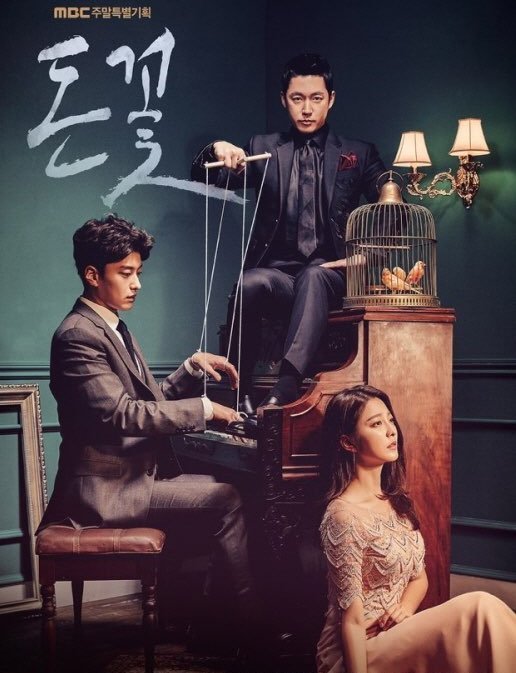
Money Flower is different. Money Flower is towering head and shoulders above every modern drama I’ve ever seen. Titanically good writing which rises above its genre and makes conventions seem radically new and fresh not by reinventing them or deconstructing them, but by playing them straight, taking them seriously, and committing 1000%. This is all your familiar rich family tropes but with masterpiece execution, infused with consequence and meaning because they’re all driven by the psychology of complex three-dimensional characters. So many moving pieces and none of them are random or unmotivated. Just... GOOD WRITING. And I want to make the point that it is this wherein art lives. The difference between a rank Lifetime movie and Romeo and Juliet is not novelty or tropes or plot twists- it’s execution.
This show is such a perfect example that it is not ‘mere events’ (aka plot) or novelty or shock value or cool ideas which separates something brilliant and timeless from forgettable schlock; it is solely and entirely execution. It’s writing itself, if you know what I mean. You can describe many of Shakespeare’s tragedies and history plays as soap opera plots. What makes Macbeth a deathless masterwork and Death Wish Hollywood wank isn’t a fundamental difference in subject or genre. It’s Shakespeare’s characterisation and purposeful storytelling. It’s the poetry of the dialogue. It’s the craft of writing. Most of Shakespeare’s plots are based on existing stories or on historical events and that has never mattered because novelty is not an inherent good or of any inherent artistic value.
Like, this is the problem with storytelling right now blah blah GOT, shitty endings everywhere etc. because power over the audience (can’t let anyone guess the plot, looking ‘clever’ with meaningless callbacks) and novelty are valued over narrative structure or things making sense or emotional verisimilitude. We have so many writers thinking being ‘shocking’ is all it takes to be a genius. It’s easy to be shocking if your story makes no goddamn sense because things that don’t make sense are literally unpredictable. Not in a good way, though. A great twist or sudden swerve needs to be unexpected but inevitable in hindsight or it does not work. I should be able to rewatch your thing and think ‘oh, of course! you can see it was [x] all along!’
We have so many popular writers now who are so shallow they don’t think anything needs to make sense on a character or emotional level. They don’t think their story has to be about anything. Substance is irrelevant as long as the surface is flashy enough. That has no staying power, you can only watch it once and you will forget about it quickly.
However, if you have ever wanted to experience the constant heightened stakes and High Drama of a soap opera without being annoyed at how ridiculous it all is and while actually giving a shit about the characters because they feel like real human beings, if you’ve wanted to feel repercussions when characters make choices, and get the emotional payoff that is the entire point of drama- now you can. Watch Money Flower. And let me tell you, it is fucking riveting. This show is mostly made up of people sitting in rooms talking and yet it is heart-pounding excitement nearly every episode. It is profoundly traditional and by the book while being totally fresh. It’s the most engrossing and satisfying artistic experience I’ve had in a long time.
Like, THE TENSION, THE DRAMA, THE REVEALS!!! You can, in fact, spend most of 24+ hours on the edge of your seat about family problems and business mergers. It seems unlikely, but that is the power of this series, it creates insanely high stakes and mesmerising suspense out of the most commonplace ingredients. Familiar plot elements become brand new and surprising under the deftness and tightness of this narrative. The plot itself is certainly 100% melodrama but it never feels like a soap opera and is never ever soapy in in a pejorative sense because it handles its classic tropes with such maturity and nuance that it's like you've never seen them before. The writing is incredible.
It is on an entirely different level than the vast majority of dramas, with a total self-assurance that keeps the pacing relentless yet unhurried- taking its time to let the impact of events be felt, the narrative always knowing exactly where it’s going and how to get there. The characters are all multi-faceted and unpredictable without ever being incoherent, their motives and goals always being gradually uncovered in more detail that only makes the storytelling and characterisation even tighter, even richer. The twists and cliffhangers are always mind-blowing but always earned, never cheap or nonsensical, and I can't remember ever thinking that about another show. (There’s literally one exception towards the very end where something a bit random happens for reasons of pure symbolism- it’s a misstep imo but it’s minor in the scheme of things)
Every time I started to doubt the writing, started to think ‘oh no, they’re going off the rails’, they showed me I was wrong and they were in total control. The only 'problem' with the show is that the drama is also profoundly painful to watch unfold, particularly in the beginning, because it's a story where everyone makes terrible life choices and moral corruption is everywhere. It's hypnotic though, like a car crash. If you can handle something dark, insidious, cerebral, and character-driven there is nothing I've seen in the same vein that can approach its brilliance. It’s like The Magnificent Ambersons as a slick modern revenge drama. There is also (PRECIOUSLY!!) a core of stunning romanticism around which all the horrors revolve and that saves it from becoming hideous or cynical. There is a chance for redemption and a new beginning after all, in spite of all appearances.
The ending has apparently been controversial, and it is definitely not quite as climatic as you would have expected given how powerfully climatic almost every regular episode is, but it's a good ending. There isn't full closure, they don't provide final resolution in a bow, but to me it's an ending about hope. It suggests optimism for our characters and I was satisfied with that. It's extremely rare for a 'revenge story’ to allow this kind of room for healing and it can do that because, imo, we discover in the end that it wasn't ultimately vengeance in Pil Joo’s heart. He has not become a tragic hero who will be consumed by the cannibalistic darkness of revenge, his quest was for justice. He teeters on the edge of the abyss but he avoided falling in; he didn't sell his soul, at least not irrevocably.
He is nonetheless a very tragic figure and an anti-hero, but despite having dedicated his life to bringing down the Jang cabal, it’s not that he’ll stop at nothing. He will make any personal sacrifice no matter how desolate, he lives as a mere husk of a man, and he facilitates enormous emotional harm to others in service of his goals, but he has ethical hard lines he never considers crossing. His sense of decency and compassion is never extinguished; he does care about the collateral damage he is causing even when making justifications for it. It’s important to him to give people as much agency as possible in their choices, to mitigate the damage done by his schemes as much as he can. To try to prevent harm coming to undeserving bystanders. Not that this makes it okay that he uses people, which he does, but the point is he never completely surrenders his moral compass to avarice. He’s never okay with burning down the world or ruining innocent lives just to get to his target.
Pil Joo is less a vigilante and more an avenging angel, he wants justice more than retribution. He wants fairness and a better, safer world where what has happened to his family won’t happen again. The reason this story never becomes Sweeney Todd (aka: a full on tragedy where we see the inevitable outcome of lust for revenge) and the reason he can survive twenty years spent pursuing someone’s downfall is exactly that principle. Searching for retribution would have destroyed him, he would have become the very thing he hated, but instead he goes as far as necessary to publicly expose the Jangs for what they are and then willingly submits to penance for his complicity in their crimes and tries to atone with the people he hurt along the way. Purged, he’s symbolically reborn and takes back his real name to maybe finally have a chance at the life he should have had. He moves on, content, a positive force. He’s capable of healing from the ordeal because he realises he doesn’t need retaliation, just seeing them stopped and facing consequences for their actions is enough.
The love story is a superbly poignant part of this. Their love is the ‘victim’ of his revenge and it will forever be impacted by it, but it’s not something that can be killed, so there’s still hope. Mo Hyeon’s bookending rescues of Pil Joo from death mean first that he has a purpose he must fulfil and then the second time that he has freedom to finally live as himself, for himself. There’s a future. And maybe they can be together there. I’m emo about it.
Anyway, if there was the slightest doubt about me becoming a long-term Jang Hyuk fangirl, it’s been put to rest. This performance is easily one of the best I’ve ever seen, period. No contest it’s the best I’ve seen in a tv drama. It’s also the most subtle and masterful turn he's delivered in his whole career. He's so restrained, but he is giving absolutely everything; he has total control over every microexpression, every gesture, every molecule in his body. There is so much simmering under his surface, so much going on in his eyes; the layers and depths are endless. The intensity and sharp intellectual focus he brings to the character is breathtaking. Everyone else is doing amazing work too, but he is almost constantly on screen and has this spectacular command of such a sprawling story, such a complex character, and he makes it look effortless. All artifice has melted away. The fact that being so tightly contained is in stark contrast to the bombastic element in many of his other roles renders its delicate precision even more startlingly impressive. I thought he was a great actor before, but I didn’t fully appreciate what he was capable of until Pil Joo.
#money flower#kdrama#writing#jang hyuk#long post#I've written a bit before about revenge and how it will inevitably lead to tragedy#so I wouldn't without explanation even call MF a 'revenge drama' because it turns out it's a complicated yet beautiful 'hope' drama lmao#it's actually a 'romance' in the Shakespearean sense#like the Winter's Tale#I guess we just call that 'tragicomedy' now but I don't find that word very helpful or descriptive#I don't think anyone actually know what you mean when you say that#anyway the first writing that is every bit as good as the production/acting side I've seen in what feels like forever#I just feel like everything is great characters in a mess of a story or brilliant performances elevating a bad script or good start-bad end#like no one knows what they're doing any more or why#but this show is incredible#it's only not perfect because the last four episodes are not up to what you'd expect for the rest but they are still really good#just not perfect#the last episode has problems but they're not with the concept of the ending at all- the concept IS perfect#and apparently I'm the only one who thinks that lol#apparently a lot of people did not understand what was happening and some misread it as a dream sequence#(this is an insane take to me- it's really not confusing or ambiguous at all)#(bc God forbid the main character not die and have a chance to heal after his absolutely miserable life?)#but yeah it's the only time anything feels rushed or not quite smooth#and one major character's fate isn't as satisfying as it could be#but I felt like I was never going to see something as engrossing as this again for a while there#anyway anyway NEW OTP#I didn't even get into it because no one cares about my giant rant here but it's SO traditional while being VERY different idk#the romanticism was so unexpected in a show that seems like it's going to be intensely cynical- it's handled with such gravitas#romance with gravitas is PRICELESS to me#the best swerve ever is for a show to NOT be cynical when it seemed so dark- that's a plot twist I can get behind
19 notes
·
View notes
Text
The TJLC Debacle: 3 years out from S4 and counting; the copyright mini-theory; so much salt I’m bloated; but in the end, there is peace (I love you Johnlockers)

Ugh, don't even talk to me about Mary.
Don't even talk to me about the way Mofftiss have said they're sick of responding to fans on the subject of Johnlock. Of how they've said they're "not telling anyone else what to think or write about them" (as if they could stop us; as if they even own Sherlock themselves. Do keep reading, because this point becomes much more relevant and in-jokey later on). Don't even mention how they've bitched and whined incessantly because--god forbid--fans got *really really* into their show and emotionally invested.
They're so eager to discount all the beautiful little moments they wrote as accidents. And Arwel, who planted all those props, continually demonstrates that he's on their side (a not-very in-depth-analysis of his Instagram account and the way he interacted with fans towards the beginning of the pandemic showed as much, but I think maybe he’s grown a bit wiser and quieter since at least in terms of Johnlock and all things elephant-related. I don’t know for sure because I stopped looking.)
Anyway--they'd actually prefer for us to celebrate our own intelligence, is I suppose a charitable way of looking at it: our ability to make connections between things in the show; our metas on symbolism; our insightful fanfic; etc., and denounce them as the bad writers that they ultimately are.
More under the cut.
(This post may be of interest to you especially if you came to the fandom a bit later: multiple links to things of relevance/quotes/explanations appear both within and at the end of this entry.)
Because what makes a writer good?
Well, an ability to make people feel an emotional connection to their work, for one. I know this is just my own perspective, but if not for Johnlock, all my emotion about the show would evaporate. There wouldn't be much else there. Other people might get something, but I wouldn’t. Is some of the writing witty and entertaining regardless of any inferred/implied Johnlock? Yeah but, eh, a lot of shows have some good writing and I just don’t give a damn about them.
What makes a writer good?
Not making promises to the reader/viewer that they'll never keep. Plot holes, leading dialogue ("There’s stuff you wanted to say...but didn’t say it.” “Yeah”) never followed through on, puns that are apparently, I suppose, unintentional (e.g. "'Previous' commander?" "I meant 'ex'").
Uh, not writing continual gay jokes that aren't actually pointing toward the inference that people are making them because there's actually something going on there under the surface. (How about just don't make those jokes ever.)
Not being, apparently, oblivious (? questionable) to the queerbaiting they're engaging in *as they’re writing it.*
Acting like their LGBT audience is in the wrong/the bad guy, instead of choosing to remain respectful in the face of dissent. Instead it's just, "we never wrote it that way" / "We never played it that way."

A lot of those other mildly witty shows don’t actually blatantly drag their most passionate fans face-down through the mud the writers themselves created. Imagine that.
I'm not even a fan of Martin Freeman anymore, for the way he handled the whole thing (getting angry, the comments he made about how the fans made Sherlock “not fun anymore”...apparently Martin’s packing up his crayons and going home?)...no offense to anyone who is still a fan of his. I don’t make it a habit to drag him. I do to some degree understand his frustration with having the whole situation taken out on him--he’s just an actor in the show--but I simply wish he’d remained as cool and professional about it as Benedict Cumberbatch instead of pointing at the fans. You’re pointing in the wrong direction, mate.
What also irks me at the end of the day is this: the subsection of people who legitimately responded badly to the TJLC/S4 debacle and went above and beyond to harass the writers and actors/actresses on social media are *few and far between*, but we've been lumped in with them by what feels like...everyone, Martin included. TJLCers/Johnlockers (not the same group, but often treated as such) have been made to look like a bunch of rambunctious, immature, demanding children time and time and again in the wake of S4.
They'd rather, what, suggest John was so in love with Mary? THAT was the relationship they wanted to uphold in that show as so significant and...what, a demonstration of how honorable it is to respect your heterosexual relationship despite, you know...ANYTHING?
Yeah sorry, I don’t believe in that. John’s text-based affair, whether a disappointment for some as to his supposed character, was a very human reaction and I kinda sorta feel like I would have reacted MUCH more strongly than that had I been John. But nope. He stayed with Mary and was *ashamed* of his wandering eye. Ashamed that maybe he wanted to be admired by someone. I can’t think of a scene, off the top of my head, where Mary ever interacted with John without belittling him in some way--if not with words, then with consistently patronizing glances.
The message here is that heterosexuality is not just acceptable, but VALUABLE, however it manifests--but god forbid anyone see a queer subtext. (Why are lgbt+ writers some of the very WORST offenders where this is concerned? And they defend it! Is this childhood nostalgia/Stockholm Syndrome of the very fondest variety or what? Gay angst is all they got if they got anything at all, so it’s still good enough as far as “representation” goes?)
They really want to tell the story of John as so emotionally/mentally fucked up that he surrounds himself with unstable people time and again. They never give any reason *why* he might do that (which they could have done even soooo subtly), or delve into his past--just, apparently it's okay to assume that Sherlock's comment about "she's like that because you chose her" is exactly that.
No. Sherlock and Mary are NOT the same. Not...*remotely*!
Mary is underhanded and evil. She lies. She manipulates. She schemes. Her “love” is based on selfishness, and her assumption that John is a simpleton and hers to mold. She's in it for herself.
Sherlock hides. He prevaricates. He feels. He loves John. He does fucked up things in the name of love, but always for the benefit of those he loves. When he screws up, which he obviously does, it’s painful to us as the audience because we see that it is painful for him when he recognizes and regrets it.
I have never seen Mary regret anything. Those crocodile tears at Christmas? More manipulation. Inconsistent with anything else we were shown about her as a character.
To even think for a SECOND that people could ship Mary and John and mentally condemn John for cheating on Mary AFTER SHE SHOT HIS BEST FRIEND...as if marriage is the be-all-end-all free pass in which every sin must be forgiven until the end of time...as if John broke any covenant with his wife beyond those she broke from the very moment she walked into his life *with an entire fake past.* Is just. Well. It's asking us to accept gaslighting as healthy, loving, normal, *preferable* behavior, so...given the source that message is coming from, it's all a bit meta.
THAT. Is insanity. Maybe Mofftiss are the sociopaths.
How these men could write characters they themselves understand so little (or tell us they understand so little because their emotional maturity has yet to surpass that of the average three-year-old’s), I will never know. I can only imagine that they have absorbed, by osmosis over their lives, real and nuanced human behavior...then churned it back out again in their writing unaware, a bit like psychopaths who teach themselves what "normal" people do so that they can pass as psychologically sound in regular society.
Remember, we *are* talking about men who do these sorts of things:
Moffat says that Sherlock is celibate and that people who claim he's misogynistic when he does things like make Irene Adler imply she's attracted to the detective (even though she's a lesbian) are, ironically, "deeply offensive" (despite lines like "look at us both" in Battersea. We aren't your therapists, Moffat--we don't care what you meant, we care what you said, and what you *said* was clear. *Implying* it does not let you off the hook).
Gatiss has proclaimed that "I find flirting with the homoeroticism in Sherlock much more interesting" than the idea of ever making a show addressing LGBT issues. (That link is to a reddit forum, and I can't find the original interview anymore, but I assure you I had seen the actual article myself ages back and can't find it online again now along with some of the Martin quotes I wanted to link to. And nevermind what Gatiss has done with LGBT shows/issues since--my focus here is on what he has said, versus what he and Moffat have since claimed regarding their queerbaiting.)
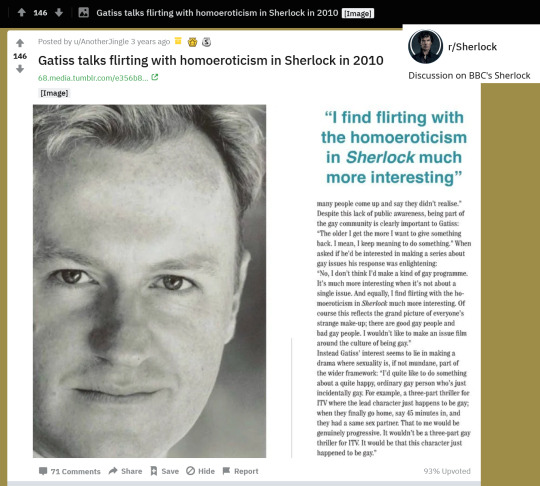
Here’s a transcript of this screenshot:
"...many people come up and say they didn't realise." Despite this lack of public awareness, being part of the gay community is clearly important to Gatiss: "The older I get the more I want to give something back. I mean, I keep meaning to do something." When asked if he'd be interested in making a series about gay issues his response was enlightening:
"No, I don't think I'd make a kind of gay programme. It's much more interesting when it's not about a single issue. And equally, I find flirting with the homoeroticism in Sherlock much more interesting. Of course this reflects the grand picture of everyone's strange make-up; there are good gay people and bad gay people. I wouldn't like to make an issue film around the culture of being gay."
Instead Gatiss' interest seems to lie in making a drama where sexuality is, if not mundane, part of the wider framework: "I'd quite like to do something about a quite happy, ordinary gay person who's just incidentally gay. For example, a three-part thriller for ITV where the lead character just happens to be gay; when they finally go home, say 45 minutes in, and they had a same sex partner. That to me would be genuinely progressive. It wouldn't be a three-part gay thriller for ITV. It would be that this character just happened to be gay."
--End article quote.
And instead, who is canonically gay in the series? Well, Irene Adler. The innkeepers at the Cross Keys. And perhaps most notably, the *villains*, because that's a helpful trope: Moriarty and Eurus are, in S4, both implied to be at least bisexual.
Any character should be able to be any sexuality, this is true. But can we have some main characters, the good guys, give some good representation? Can't we start making that the standard, rather than the villains and the background characters? Because so far, that is the exception and not the rule.
Writers need to be aware of the damage they are perpetuating. We are not quite in a world yet where any character should be able to be any sexuality but isn't, yet we have no problem with saying the villain is LGBT+ or looks different/functions differently than much of the viewing audience.
"Male friendship is important and valid, not everything has to be gay"--this is a popular point with casual heterosexual viewers (and, to my chagrin, some of my LGBT+ friends) who don't fully grasp what "queerbaiting" is, often even when it's pointed out to them.
The lens of heterosexuality is real. My first time through watching BBC Sherlock, I didn't see the Johnlock at all. I had to look for it and read about it. When I saw it, the lens was lifted for me, and it changed my life and the way I view things forever (and for the best).
But back to my point about how little Mofftiss seem to understand their own story/most ardent fans, and then on to my other theory: in S4 it must be that they dropped their “psychopaths emulating empathy” act and indulged in their own "insane wish fulfillment" by doing away with all of the meaning, continuity, and sense. Right?
So, here’s the alternate theory. One which is not, please remember, in their defense.
Remember that S4 is what Mofftiss are *happy* to have us believe is what they'd do with these characters, given the chance to do whatever they wanted. I repeat, in Moffat’s own words: “Insane wish fulfillment.”
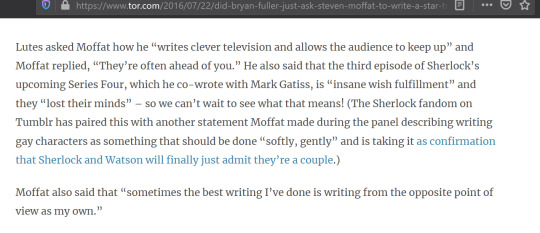
Okay I get it, this pasta has been over-salted.
Without further delay: MY COPYRIGHT RESEARCH THEORY THAT EVEN I DON'T PUT MUCH STOCK IN AND WHICH DOESN’T MAKE UP FOR THEIR CRUELTY EVEN IF TRUE
Part of me also raises an eyebrow at S4 as perhaps an example of the effect of the Conan Doyle estate on any modern production in the US. While it’s true that all of Sherlock is part of public domain in the UK and has been for quite a long time, Gatiss and Moffat still talk about it being partially under copyright. Specifically, the last 10 stories. I’m supposing that this means that because Sherlock airs internationally, or due to whatever contract the BBC has with the Doyle estate, they are still limited by the copyright as to what they can “publish”.
The Doyle estate is known for being a pain in the ass when it comes to abiding by copyright law as everyone else knows and practices it. They’ve tried to argue, for example (in 2013 and, much more recently, with the advent of Enola Holmes), that because Holmes and Watson were not fully developed as their final selves until the conclusion of all 10 stories still under copyright, then perhaps the characters themselves should still be protected, basically, in full.
It’s true that certain elements of the remaining stories are still under copyright here in the US (Watson had more than one wife--uh huh, we have that to look forward to, Johnlockers; the Garridebs moment is still under copyright--yeah, I’m getting to that too; and Sherlock didn’t care much for dogs til later so that’s not allowed either, fuck off Redbeard), but the estate’s problem in 2013 seemed to be based around a fear that *gasp* some day--if not right now!--anyone could write a Sherlock Holmes story in any way they pleased, changing the characters however they wished to and giving those characters “multiple personalities.”
See the following excerpt from the Estate’s case:
“...at any given point in their fictional lives, the two men's characters depend on the Ten Stories. It is impossible to split the characters into public domain versions and complete versions.”
(Click for full transcript.)
Obviously, by this point, that’s been done in multiple iterations. So I dunno. Their argument was *more* than muddy to begin with--they just grasp at straws to stay in control, it seems.
But okay. Backing up: wasn’t there sort-of a Garridebs moment in S4?!?? you cry. Yep. But imagine this: the Conan Doyle estate taking Mofftiss to court to argue that they depicted the Garridebs moment--a moment still under copyright--in The Final Problem.
Did they, though? Did they really?
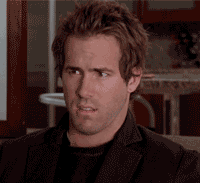
The fandom cried out about the ridiculousness--the utter disappointment--of that moment when it was shown. It was not what we would have expected/wanted. We didn’t see John injured, Sherlock reacting with tender outrage to the good doctor’s attacker.
Instead we saw some ludicrous BS that was as bad as the clown with the sword-gun-umbrella. More of that.

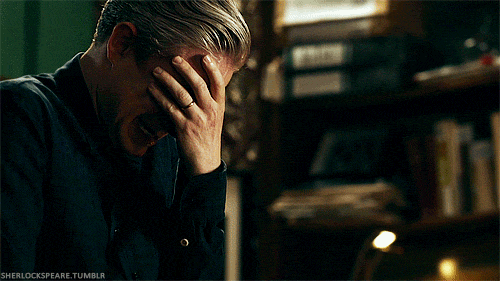
I think Martin probably found that it was easy to produce real tears when he thought about how fucking terrible the S4 scripts were.
Ahem. Yet, this all seems very Mofftiss-flavored in terms of humor.
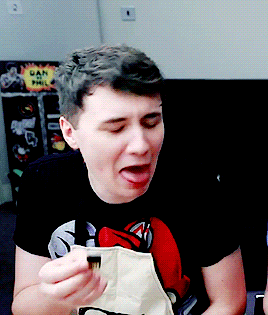
I can all-too-easily imagine them saying, “HA. We’re going to show some of these supposedly copyrighted things--and if they take us to court, they’ll be laughed out of the room.” Could that explain some of the overall S4 fuckery?
Sherlock wasn’t supposed to like dogs til later stories, as previously mentioned-- is that why Redbeard pulled a “Cinderella’s carriage” and transformed into a pumpkin (Victor Trevor)? Hmm. Sigh.
It...doesn’t actually appear that the estate has any qualms about taking laughable stuff to court, I mean...*shrug.* They have the money to do it, and money is the name of the game, because you’ve got to pay for rights (cha-ching sounds).

Yep, it does seem that the estate is open to the copyrighted materials being made reality, but who knows for what price or with what caveats. The BBC isn’t, so far as I’ve ever heard, known for throwing money around. Early Doctor Who would be so much less entertaining if they’d had any sort of budget. (And in fact, more of the older episodes would exist, but apparently the BBC--in part to cut costs--reused some of their tapes.)
My bottom-line bitter is this: Mofftiss do like to amuse themselves. To please themselves and no one else, as they’ve shown time and again. Sure, they could do whatever they wanted with S4...and they did...but they were also cruel about it, and that’s what I’ll never forgive them--OR the BBC--for.
A lot of fans gave up after series 4. I was very nearly one of them. I was angry, like just about every other Johnlocker and/or TJLCer, but I was really truly heartbroken. I couldn’t look at fanfiction. My days were full of bitterness and I keenly felt the lack of the fandom outlet that had become so essential to my mental well-being. I didn't know how to overcome the disparity between TJLC and what the show actually was. I didn't know how to separate the things I loved so much from the shitty writers and the way the BBC handled things with their whole response letter (that atrocious, childish blanket response they sent to everyone who complained about S4, not just the Johnlockers/TJLCers. Related to your complaint or not, if you filed one post-S4, this was the response you got). I still boycott BBC shows/merchandise, just by the way.
I tried to link to the blanket response letter but the link didn’t want to work (it’s an old reddit post; I had difficulty finding a copy of the letter elsewhere though at one point it wasn’t so hard...Google is weird these days y’all...tell me it’s not just me) so here’s a screenshot:
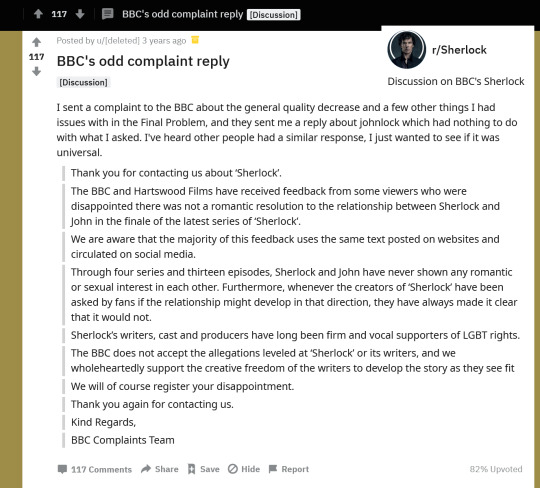
Transcript:
“Thank you for contacting us about “Sherlock”.
The BBC and Hartswood Films have received feedback from some viewers who were disappointed there was not a romantic resolution to the relationship between Sherlcok and John in the finale of the latest season of “Sherlock”.
We are aware that the majority of this feedback uses the same text posted on websites and circulated on social media.
Through four series and thirteen episodes, Sherlock and John have never shown any romantic or sexual interest in each other. Furthermore, whenever the creators of “Sherlock” have been asked by fans if the relationship might develop in that direction, they have always made it clear that it would not.
Sherlock’s writers, cast and producers have long been firm and vocal supporters of LGBT rights.
The BBC does not accept the allegations leveled at “Sherlock” or its writers, and we wholeheartedly support the creative freedom of the writers to develop the story as they see fit.
We will of course register your disappointment.
Thank you for contacting us.
Kind Regards,
BBC Complaints Team
So how about that? *Did* they “register our disappointment”? We can actually check that. The BBC’s website has a monthly summary of complaints received. So what did they receive in January 2017, the month S4 aired?

Huh, what do you know. Sounds like that blanket response was exactly the “fuck you” it came across as.
But the show--the FANDOM--had filled a need in my life, and so I had to own that and make it mine, or just...let something in me die: something that felt like an actual vital organ. I had to decide that these characters mean something to me beyond what anyone else tells me they should. I had to accept my own perceptions as truth, as I do with everything else in my life. I had to overcome the idea of canon as law (BBC Sherlock isn't canon anyway; ACD is canon. BBC Sherlock is, in the end, badly written fanfiction--or--worse?--decent pre-slash fanfiction distorted by consistent lies and the hazing of the LGBT audience, topped with the dumpster fire of S4′s incoherent nonsense).
I had to take the good and throw away the bad, just like anyone else who chose to stay. The good bits of the show...dialogue, yes. Plot points, yes. These awful writers did write some good stuff sometimes.
They just broke all the unspoken rules of what not to do to your audience. And then did and said everything they could not to apologize, and to justify their own failings. Which, in the years since I began shipping queer ships beyond any others, I have unfortunately experienced more than once.
So, my vulnerability has been yeeted into the vacuum of broke-my-trustdom: no one can tell me what things should mean to me. I will decide.
I decide that all of the FUCKING AMAZING writing in the Sherlock fandom is a staple in my life that makes it worth living. And that that's okay. And takes precedence over anything the writers or anyone else associated with the show could ever say or do.
Johnlock can not be taken away. It doesn't belong to them. It never did, even if they brought us to it. It belongs to us. To the group of amazingly creative, brainy, empathetic, resourceful, vibrant, resilient people who make up this fandom.
So thank YOU, all of YOU, for giving me Sherlock, Johnlock, and TJLC.
I am SO SAD for those who never found a way to make peace with this fandom again. Let me just say that I understand that inability entirely.
I am fortunate that I found the ability in myself to cling to the joy (something it has taken my whole life to be able to do). I hope others will who haven’t yet but wish they could.
Let Mofftiss and whoever sides with them stay angry and bitter and vicious, always looking over their shoulders for anyone who dares to whisper about subtext.
I’m proud to be part of what they’re whispering so angrily about.
Thanks for sticking it out if you made it this far. I know this was very self-indulgent and rambly.
Articles of interest:
A Study in Queerbaiting (Or How Sherlock Got it All Wrong) by Marty Greyson
“We never played it like that.” - Martin on Johnlock
Henry Cavill on the Enola Holmes lawsuit
More on that--and by the way Sherlock isn’t allowed to like dogs
The way Sherlock creators told fans Sherlock & John aren’t gay is so rude
Especially for those new to the fandom who may not know the distinction between TJLC and Johnlockers and want to know more about TJLC's evolution/what it is/meta through the years
Moffat's view on asexuality, offensive to me in particular *as* an asexual person (same article where he claims he isn't misogynistic): "If he was asexual, there would be no tension in that, no fun in that – it's someone who abstains who's interesting."
Yet he says Sherlock isn't gay or straight and that he's trying to keep his brain pure which is a "very Victorian attitude"
(Nice historical research there, Moff--actually the Victorians were sex-positive).
Sherlock fans were robbed of the gay ending they deserved
Benedict Cumberbatch has lashed out at his Sherlock co-star Martin Freeman over his negative attitude towards fans
BBC complaints January 2017
Martin Freeman: 'Sherlock is gayest story ever'
From 2016: UNPOPULAR OPINION: "Sherlock" Isn't Sexist or Queerbaiting; It's Actually Trying to Stage a Revolution
Queer-baiting on the BBC's Sherlock: Addressing the Invalidation of Queer Identities through Online Fan Fiction Communities by Cassidy Sheehan
#bbc sherlock#bbc sherlock salt#sherlock s4#sherlock holmes#acd#john watson#sherlock copyright#mofftiss#queerbaiting#johnlock#tjlc#johnlock fanfiction#fandom#writing#fandom life#sherlock fandom#tjlc fandom#johnlock fandom#sorry for the salt sometimes you just need somewhere to put it all#the bbc
36 notes
·
View notes
Text
Prompto’s Brotherhood Arc is Fatphobic 2, Electric Boogaloo: Haley’s Back and She is Pissed
This essay is going to be an even deeper dive into the fatphobia that permeates Prompto’s character arc, and is going to handle the issue with more grace and nuance than I did the first time. This is also going to explore the effects the arc had on me as a player, and on other players who share my experiences. It is going to be very organized, long, and methodical (word count: ~5300). It’s a bit of a doozy, but it is something I feel it is very important. I have been wanting to elaborate on my previous Prompto essay for a long time, and for reasons I will detail below, I feel that I am ready to do this now.
Consider this a sequel to my earlier essay, and I will be referencing it throughout.
Stand back everyone; Haley’s about to get mean and personal.
Under the cut for safety and length, please avoid if the subject is triggering to you! Take care of yourselves!
Thank you all so, so much for hearing what I have to say.
TW: fatphobia, eating disorders (both in terms of Prompto and of the author)
Intro
All right everyone, buckle in. Last time I think I was a little bit too nice about this. Last time I think I let a little too much go. But I’m a full three years older now and I’ve seen a few more things. And now I think it’s time that I really just let loose and criticize the fuck out of Square for something they have consistently done wrong, and that is the way they have handled issues with weight in regards to one Prompto Argentum.
Many of you may know that Prompto is one of my favorite characters in anything ever. This very sideblog, in fact, used to be named for him (old url was promptoisbi). It’s because of this that I hate that he’s so consistently shit on by the narrative, but right now we are talking about the out-of-universe insidiousness of the fatphobia that completely permeates this story.
The first essay is right here but the TL;DR version of that is essentially “the way that Prompto’s weight loss in Brotherhood is portrayed as a moral and positive good and in fact necessary for him to be a protagonist is immensely fatphobic. Because the game refuses to problematize this, I am going to, and I’m going to contextualize that with my own experiences to help explain why this is so fucked.” At that time, I was recovering from long-term anorexia, and I think that permeated a lot of what I wrote. I don’t regret this, and I still think the essay is pretty solid. But I’m not a woman who won’t admit her own limitations, and one of mine at the time was that a lot of my fatphobia was internalized. Now that I am healing, now that I have talked to other people with experiences that mirror my own (notably @chubbyargentum), I think I am in a better place to articulate what upsets me.
The rest of the essay will be divided into six parts, themed as follows:
A redux of my central criticism in the first essay, that the narrative treats Prompto’s weight loss as a positive, moral good. In fact, it’s necessary for him to be seen as a protagonist.
Detailing that Prompto’s weight loss was directly motivated by another character, and this other character does not apologize to Prompto at all for his previous behavior. We are in fact supposed to believe that him saying what he said was a good thing.
Evidence that Prompto still legitimately has an eating disorder from his trauma. This goes unexamined by the story, and in fact seems to be actively encouraged by other characters, notably Ignis and Noct. This isn’t to bash the characters, but the way they are written.
Points 1 and 3 combined produce a genuinely triggering experience for players like me; this is where I detail some of my own history with weight and eating problems.
Anticipating pushback, I propose two alternative scenarios that avoid the problems outlined in parts 1-4: one where Prompto doesn’t lose weight, and one where he does but it’s handled a lot more sensitively.
A personal look at what (and who) actually motivated me to do a Part 2 to my essay.
Followed by a TL;DR conclusion if you want to jump right to the heart of things. I know this is a long essay, and I don’t apologize, but I do want to make it accessible to those who might have a harder time reading something so long.
Time to knock down these points, one by one:
Part 1: Equating Weight Loss to Morality
Prompto’s episode in Brotherhood, “Dogged Runner,” serves as our introduction both to Prompto as a character, and pulls double-duty to show us how he becomes involved in the life of a prince. Gladio and Ignis’ episodes did not have to do this double work because they are in Noct’s life by occupation, but Prompto, being a commoner, needs this introduction. Unfortunately, this episode is not twice as long to handle the double workload it gave itself, and the plot clearly suffers for it. For those who don’t remember, Prompto seems to be a child who more or less raises himself--a shy boy who is in the same grade as Noctis. He is quite obviously overweight, and the episode in fact chooses to focus the bulk of its attention on that rather than how he met Noctis (this will be explored in Part 2, below). This is what I take issue with.
Due to....an encounter, we’ll call it, with his royal classmate, Prompto becomes motivated to “improve himself to become someone worthy of a prince,” as described in Episode Prompto. Right off the bat, this description is implying that in order to be worthy of Noctis’ companionship--even independently of Noctis’ own actions, which will be problematized in the next section--he must be different than the way he is.
This...doesn’t make sense. We already saw that Prompto was a kind and generous soul, if rather shy. He took in “Tiny” of his own accord; he fixed her up and fed her and made sure she was healthy, solely out of the goodness of his heart. What else could this literal child need to “improve” about himself to make friends with Noctis? Well...the episode focuses on this in a way I would almost argue is objectifying. We see in excruciating detail how this literal child (I feel the need to mention again that Prompto is 12 years old and doesn’t seem to have consistent parents) approaches the world with a black-and-white mentality….that is, he seems to focus exclusively on eating salads and running an excessive amount (we’ll get to this more in Part 3). Further objectification occurs when we are shown repeatedly that a minor is taking “progress shots” of himself in his underwear.
A bit of a tangent, but the way that last one is drawn...y’all did remember Prompto was 14/15 at that time, right? Extra H points for Square, right there.
So yeah, once all of this happens, Prompto is finally deemed by the narrative to be acceptable enough to enter the life of a prince. Basically, if you’re fat, get a goddamn eating disorder and you can be a protagonist!
And I’m actually gonna take a second right now to address the more common, and generous, interpretation/criticism I am anticipating. I know what SE was trying to do here. They were trying to show us that Prompto’s “self-esteem” was the problem. That he needed to gain more confidence, and losing the weight didn’t actually solve that problem. I know this is the intent because the hotel scene exists. But...answer me this. Why is losing weight treated as an analogue for Prompto’s internal character growth? Why is losing weight an analogue for literally anything? If the issue was Prompto’s insecurity and shyness, there are a dozen other ways to show that. I can think of one right now: maybe have Noctis try to make friends and Prompto runs away because he gets nervous and tongue-tied and that’s the source of their lingering awkwardness. There you go, much better episode.
Part 2: Noctis is a dick
And I say this as a Noct stan. Y’all know I love him. With all my heart, I do. But...I don’t think he starts the game as a good person, in this respect at least. I do think he becomes one. And I think that his growth and maturation over the course of the game is absolutely a treat to watch.
I’m gonna immediately qualify this by saying I do not think Noct is a dick on purpose. Noctis is, in fact, unfailingly kind in most situations and this is one of his greater strengths. I just think he is just as much a victim of internalized fatphobia as Prompto is, despite not having the experience of being fat. I think two things contribute to this: biases that went unchecked by any of his caretakers, and genuine social difficulty brought about by his upbringing.
But now it’s time to get to….the incident. The reason these two know each other. After Prompto takes care of Pryna, she runs to deliver her letter to Noctis and eventually returns to Luna, as was her original mission. Luna, noticing Prompto’s name on a bandana tied around Pryna’s leg, tasks Gentiana to help her find this kind soul so she can thank him. Luna does, and Prompto receives a letter that soon becomes his prized possession. The princess operated on the assumption that Prompto and Noctis were friends, seeing as Prompto encountered Pryna, and asked that he remain “ever at [Noctis’] side.” Prompto takes these words to heart, and resolves to introduce himself to his royal classmate.
Here’s where the problems begin. We know that Prompto is shy because we have seen him before. He kinda kept to himself, away from the other kids, content to take his pictures. To Square’s credit, I was really expecting Prompto to be a target of bullying because of his weight and he wasn’t….yet. This actually makes his interaction with Noctis a lot worse, however. We all know what happens next: Prompto does try to introduce himself to the loner prince (who, by his own admission later, was also kinda shy), and he happens to trip. Noct goes to help him out because he’s kind at heart, and a confused Prompto thinks that Noctis means that he wants to see the camera. Noct is baffled and says something along the lines of “I meant you, dummy!” and goes to help Prompto up.
Honestly, end the scene here. They become friends because Noct is unexpectedly kind to someone he didn’t even know, and that sticks with Prompto, and they’re childhood best friends. Right? RIGHT?
If Square had had a modicum of decency, yes, this would have been how the scene closed. But then Noct had to open his fucking mouth. When trying to help Prompto up, he remarks that the poor boy is “heavy,” something that quickly and immediately impacts Prompto. Noct, also being 12, seems none the wiser and jovially heads off to meet Ignis. But Prompto? Prompto is….affected by this. He decides then and there that he has to not be heavy anymore if he wants to be Noct’s friend.
“But Haley!” I can hear y’all saying, “Isn’t it Prompto’s fault for internalizing a harmless comment in such a way? Why are you so angry at Noct because Prompto took it too seriously?” Or alternatively “Noctis was also a child, he didn’t mean it!!”
Well, it’s all about how the narrative treats the situation. I mentioned this before in Part 1, but the reason I’m mad at both Noctis and Square is because the narrative treats him as though he is in the right at all times. If the issue really was with Prompto as a character, then we wouldn’t have been shown his journey in such excruciating detail. We wouldn’t have been subjected to the downright harmful avenues he goes down in pursuit of this goal (see Part 3 for elaboration). We would have just seen Prompto trying to work on becoming more outgoing--maybe talking to his neighbors more often, for example.
One small scene in particular gets me here: we do see Noct return to the place where they met and he seems to be baffled by the fact that Prompto will not talk to him. We in fact know this to be the case because in the hotel scene, Noct explicitly says Prompto “should have said something sooner” in terms of starting their friendship. Now, this pisses me off for two reasons:
That this wasn’t addressed in Brotherhood itself. We see that Noct kinda wants to approach Prom again but doesn’t seem to know how. If we are assuming he messed up on accident, this would have been a great time for Ignis to tell him so, maybe motivate Noct to apologize.
That Prompto doesn’t immediately call Noct out for this line, or say something along the lines of “Well you kinda straight up insulted me when we first met.”
So, because neither of these scenarios is the case, I have to assume that Square wants us to think that Noct was correct to insult Prompto, and that him losing the weight is a good thing, in a narrative sense.
Finally, it’s straight up out-of-character for Noct to be this way. Not the misspeaking part, that is perfectly in-character. It’s the fact that this bias of his goes unchecked by Ignis or Gladio, and he is never made to apologize for hurting another person’s feelings. Part of growing up is realizing that sometimes your actions can hurt other people, even if you don’t intend for them to. The fact that the intent wasn’t there doesn’t mean the hurt wasn’t real. Since Square is so convinced that Noct needed to “mature” in this story...I am immensely disappointed that the opportunity wasn’t taken here for him to learn. And even more disappointed because I am pretty sure this is intentional. Every single one of Square’s fat characters is used as a side character or comic relief. In order for Prompto to be a protagonist, he had to lose weight, and to have Noctis--the central protagonist--be the character to directly motivate that is a slap in the face.
Part 3: Don’t Recover, Buddy!/ It’s actually good that you have “obesophobia”
So I know I put the trigger warning at the top of this, but I’m doing it again, because now I’m gonna talk about eating disorders. So this is your last chance to back out if that stuff is legitimately triggering, which I understand.
I’m gonna say it right now: Prompto has anorexia
[several people are typing…. .jpg]
I don’t think this is subtle, and I do think this is intentional, so let me break it down. Prompto exhibits a lot of the symptoms, and yes I am speaking from personal experience. He’s exhibited all of these from the moment Noct made that comment when they were kids, and, notably, only from that point on (hence why I wrote Part 2 the way that I did):
Prompto has an obsession with fixing meals. He’ll be the one that helps Ignis the most often. In Prompto’s case, this is a sign that he loves preparing the food, not so much partaking: classic hiding of symptoms. There is also the fact that most of the salads are his favorite meals, which yes, is a deliberate callback, but I don’t think it’s a good one.
Prompto runs a genuinely stupid amount. I think that exercise is well and good--I’m something of an exercise buff myself--but it’s the way that Prompto does it, to the point of exhaustion, that is a problem.
Despite being borderline underweight, Prompto legitimately still seems to think that he is still fat. This is supported by his reactions to multiple dialogues, which I’ll get to in a second, and the “obesophobia” thing on his character profile which….yeah I shouldn’t even have to explain that one. Prompto is legitimately afraid that he will gain weight--specifically, that he will be fat again.
The fact that according to that same profile, Prompto’s photography habit started when he took progress photos of himself!! So he’s also got some legit body dysmorphia going on.
These are the ones that are most obvious to me, anyway.
“Now okay, Haley,” y’all are furiously typing, “so what that Prompto has anorexia? That’s a relatable character flaw!”
Well….one, no it isn’t. A disorder of any kind is not a character flaw. I’d be willing to let that slide if the following were not also true: other characters seem to reinforce these behaviors of Prompto’s, and I am looking directly at Ignis and Noct. Let’s start with Ignis. I’m sure we have all gotten the random dialogue of
Prompto: All right, let’s hit up the Crow’s Nest!
Ignis, for no fucking reason: If you wish to put on weight? Certainly.
Prompto, defeated: Yeah, I know…
Every time I get this dialogue I want to yell and also want the option to kick Ignis out of the party. Also the fact that no one steps up on Prompto’s behalf (notably, you know, his goddamn best friend!!) is a bit of an Issue too. Another one involves Ignis, but I have only gotten it once, so I can’t remember it exactly, but Ignis says something to the effect that he can make “whatever [Prompto] wants” for dinner and Prompto says “Yeah, it’s the wanting that’s the problem.” That’s...that’s horrifying and y’all should be concerned for your friend.
To turn my attention back to Noct, objectively the most important person to Prompto, we need go no further than “Why is your face so fat?” in selfies.
This one legitimately made me mad. Prompto panics and retaliates with “What?? I’m not fat!!” (notably, he said “I” and not “my face,” which is a bit of a slip), and Noctis is supposed to be his best friend. I was somewhat okay with Noct being passive in the earlier incidents, because maybe he wanted to spare Prompto the group drama that would ensue, but Noct directly engaging in it actively pissed me off. I also want to say this isn’t me bashing on the characters in the slightest, I am simply calling attention to the way they are written. Because they are not called out by anyone else, because this behavior is treated as acceptable, I have to assume the narrative wants me to agree with them.
The only conclusion I can gather from this is that not only are the bros aware of Prompto’s disorder, but they actively encourage it. Which would only further Prompto’s assumption that they only will love and accept him if he looks a certain way. No wonder the poor kid was so freaked out about his barcode!
Part 4: This shit is triggering to players
The subtitle for this section should be “Haley talks about how deeply “Dogged Runner” affected her in a PTSD kind of way” because that’s what I’m going to be doing. Second trigger warning for eating disorders and weight talk, because that’s what this is gonna be. This also is not going to be nice. I have strong language for Square:
Here’s where I come clean about why this issue matters so fucking much to me, and why I am now freely and openly saying “fuck you” to Square every chance I get. When I first saw Brotherhood, I was at a stage in my life where I was not coping well with my body image. I had my first brush with anorexia in high school, but it was coming back because I was in a new place, and I felt like that was the only thing in my life that I could control. So I had been eating less and falling back into the habit, except...this time I had my support system. So I thought. I went into the anime wanting to learn more about the characters I had come to love, and I walked out of it thoroughly triggered and horrified that Square would stoop to such shoddy, lazy, and harmful storytelling.
I had...a moment, here. I won’t detail the breakdown too much but I was genuinely not okay. To see behaviors that I had ferociously clawed my way out of, and was violently resisting once more, portrayed not only as not unhealthy, but as desirable for people like me...it genuinely felt personal. And, I imagine I wasn’t the only player who felt that way. In fact, because I have talked to other people like me, I know this is the case.
Let me take you on a trip, for a moment. Humor me. Imagine you’re in your early 20s, and you’ve put a lot of ugly, horrible coping methods behind you. Imagine your best friend in the entire world, @nonbinary-recipehs, recommends this game they are playing, and you play it together and start to consume its media. Imagine the horror and dread that settles on the both of you watching this episode, which rings so similarly to the times you passed out from lack of food, from over-exercising, from over-straining yourself to be this idealized version of thinness. Imagine seeing that the outcome of this episode isn’t Prompto getting the support he needs from his friends, but that the narrative legitimizes his suffering. In fact, this brutal suffering and rapid loss of weight was necessary to justify this character’s relevance to the narrative! Imagine how that must make you feel. Maybe those coping methods that were so horrible actually weren’t. It worked for Prompto, maybe it’ll work for you!!
Perhaps that little thought experiment will help you understand what this whole situation can feel like to players like me, to people who have struggled with internalized fatphobia and with eating disorders, who have been called heavy, who have been made to feel as though their worth is in their thinness. Fuck you, Square. Fuck you for not having an ounce of consideration for how this might possibly look. Fuck you for not considering people like me as complete people. Fuck you for making me watch a character I love suffer, not to tragedy, but to an illness that could have been avoided if anyone had shown him even an ounce of respect or care or decency or decorum--
…
I did warn y’all I was angry, this time.
Part 5: Two Alternative Scenarios that would Avoid All This
“So Haley,” you’re saying, somehow having read past the rant in the previous section, “if Square did it so horribly, how would you have done it?”
That, my dear reader, is an excellent question. In fact, I’ve got two solutions, which I will explain and elaborate upon below:
The first is rather simple: Prompto doesn’t actually lose the weight and becomes a canonical fat character. Absolutely nothing else would change about the story or Prompto’s character except for the following:
Noctis would become curious as to why this new friend of his was avoiding him. He then has the opportunity to open up to Ignis or Gladio and reflect on what he said, and realize that he actually hurt Prompto’s feelings. This motivates him to apologize, and the two become Actual Childhood Friends.
Prompto just Has This Body Type Now and nobody says dick about it, that’s just the Way He Looks
You could explore internalized fatphobia I suppose but I don’t actually trust Square to do this sensitively. You know who I do trust? Liam ( @chubbyargentum ), who writes the Nighttime Sunshine AU and fic.
All of the previously mentioned fatphobic comments are completely removed because all the bros love and support him.
Prompto isn’t the comic relief because of his size, he just happens to be both. Yes, there is a difference, and no, I am not going to derail the essay by explaining that.
Prompto would still absolutely kick ass, take names, shoot people, love chocobos...all the shit he does in canon. But now, you have a character who didn’t have to be completely humiliated to get to this point. Now you just...have a guy who happens to be friends with the prince, because he is kind and caring.
But okay, let’s take another approach. Let’s say Prompto does still lose weight. How, then, do we accomplish this without being fatphobic or debasing Prompto’s character like canon did?
That leads me to solution 2: Prompto does lose weight, but it’s incidental. Let me explain what I mean here:
Let’s have a situation in which the apology does still happen as I outlined in the first solution. Childhood friends is a thing.
As such, Prompto becomes...increasingly curious at all the cool training Noct does.
Noct is….embarrassed about this, I think. Because Prompto doesn’t like Understand What It All Means...and they’re still pretty young. Noct doesn’t want him to understand.
But Prompto? He wants to be able to Do Cool Shit, especially if it means defending his best bro who also happens to be the prince. And he doesn’t want Noct to do any of this alone. He asks to train with Noct, no special treatment (except for like the fact that he legit can’t do magic).
Gladio...allows this, begrudgingly. Then, permanently, when he notices Noct tries harder as a result of showing off.
Prompto starts to learn how to take care of himself from Gladio, and from Ignis, who has...gathered that Prompto doesn’t exactly have parents, and becomes invested in helping him learn how to cook healthy meals for himself. Who knows? Maybe the healthy eating will rub off on Noct!
The result is that, over time, Prompto does lose some weight...and starts to bulk up as Puberty Happens. However. This is all incidental. Prompto never set out to lose weight because he hated himself or felt unworthy, like in canon. He set out to become strong and train with his best bro. This is absolutely critical.
With this solution, Prompto does lose weight, but doesn’t become the borderline underweight young man with an eating disorder we all know and love. Instead, he’s been brought up around healthier traditions, which makes him immensely more suited for the role of Crownsguard when that time comes. In fact, he might have entered it at age 18 just like Gladio and Ignis did, despite Noct’s protests. Another thing I like about this solution is that it shows how Prompto is friends with Ignis and Gladio; how those relationships developed independently of Noctis, and why these four really are the family unit the game wants me to think they are.
And with these two solutions, I believe I have laid out some much stronger backstories for our beloved boy that avoid all of the...unfortunate implications of his canon backstory. I only wish that Square had thought about their implications just a little bit more, and done Prompto some true justice.
Part 6: What motivated this essay, and the power of shared experience
This isn’t really a proper conclusion, that’ll be in TL;DR, but I would be remiss to not include what actually motivated me to write this massive essay, and also share it with all of you. The sharing part, I think, is super critical. When you inhabit marginalized identities, and in this case I specifically mean having a fat body, it can be...difficult to share and discuss your experiences. Harder, still, to be public about them, and to criticize media that perpetuates these harmful ideas. But here I am, doing that. Here’s why that is.
About a month ago, I met @chubbyargentum, who is called Liam. I was cruising through the promptis tag, as you do, and found his Nighttime Sunshine AU, and his blog is filled with excellent art for it as well. The premise of this AU, on its face, is very simple: it’s a story where Prompto and Noctis did not actually become friends in high school, and two very important things are different: Prompto is still fat, and Noctis is a closeted trans man. While I can’t speak to the trans experience, I can indeed speak to the experience of inhabiting a fat body. And this AU….spoke to me. I don’t want to spoil too much but there is a rather emotional scene that just...confronts everything I wanted Square to confront about this that they never did. He approaches the topic with so much sensitivity and nuance, something that is so rarely seen in fandom.
I’ve talked with Liam every day since, and my brain has consistently been enlarged. A lot of things I let slide before...felt so egregious to me that I had to say them. I’ve been confronting my own internalized prejudices towards certain kinds of bodies all the time, and I am learning every day. He’s become a very dear friend of mine, and I care deeply about him.
This also came at I guess you could say the “first climax” of my journey with weight loss, which I had never had success with despite the trauma I described in Part 4. I’ve lost...a significant amount of weight since March, and I think the reason I’ve had so much success is 1) the support of my friends (notably @nonbinary-recipehs, @pocket-prompto, and @chubbyargentum), and 2) not feeling like I hated myself anymore. I approached it as a journey to become more strong, not less fat. As I outlined in Part 4...Prompto’s Brotherhood episode and character backstory were and are legitimately triggering to me, and, I imagine, to many others. Liam had the confidence to put the content in the world that he wished to see, and this essay is helping me do the same.
Having other people who share your marginalized experiences and validate them...well, I’m sure many of you know. It’s a feeling like no other. And I’ve never really had this feeling explicitly about the experience of being fat until now. Now, I understand that my anger is in fact, righteous. And I am not afraid to say so. The power of shared experience motivated this essay and, in fact, everything that I do on this blog. I have come away from this AU with the bravery to say aloud what I have always known to be true.
So thank you, Liam. Thank you, big brain group. And thank you, readers, for listening to an experience that may or may not mirror your own, and for opening up your heart enough to hear the roughly 5000 words before this point. Thank you for making the effort to understand, and the effort to learn and grow.
TL;DR
I did promise to provide an easily digestible version of the…(checks word count) ~5000 words before this point, so here we go. The central thesis of this essay is something like “the way Prompto’s weight loss arc was portrayed in Brotherhood is horrendously fatphobic for a number of reasons.” I then broke it down into six major pieces: the first four being the fact that weight loss is treated as moral by the narrative, the uncharacteristically dickish actions of Noctis, the fact that Prompto’s disorder is encouraged by other characters, and the out-of-universe triggering effects the story has. In the fifth piece, I outlined two alternative scenarios: one where Prompto doesn’t lose weight at all and remains fat, and one where he does lose weight but healthily so and fleshes out his character. In the final piece, I explained the motivation behind writing this essay, namely interacting with other fat fans like @chubbyargentum. I explained all of these points in great detail, being careful to stress that my issue with this isn’t any of the individual characters, but the bias that motivates the writing.
So...what now? Well, I’m not really sure. But this was something I really had to put into the world. I think it is important and necessary to speak up and criticize media that harms you. And you know what? Final Fantasy XV is still my favorite game. It is because I love it so much that I was motivated to write this, and by sharing it, I hope to contribute to a greater discussion about fatphobia in gaming, and in life.
#final fantasy xv#ffxv#tw fatphobia#tw eating disorders#prompto argentum#please be respectful with this one#i feel like this is an unpopular opinion#but it is incredibly necessary that i say this#because it is something i believe#and because I don't want square to continue to get away with it#thank you for read#haley.exe#haley writes ffxv#haley has opinions#i'm preparing for so much hate
63 notes
·
View notes
Note
Less than a week till this blog closes. Do you have any wisdom to share about navigating the Agere community? What have your learned? Were there any particularly enlightening moments?
So honestly the blog closing has yet to fully hit me (the fact I am turning 18 has yet to really hit me lol) but I have been trying to think about what I will be taking away from this blog. I mean for a blog so filled with drama during some. points I always loved being here so there must be a reason.
I think I know the reason.
The internet is filled with perspectives and many contradict. The backlash many people face for expressing an opinion is real and can have a huge impact. I think that leads to people being very set in their beliefs since nobody can challenge them if they remain unspoken. When I joined agere I was 13. I was immature and not yet aware of some mental health struggles (that I got treatment for in 2018) I wanted to fit in so I ended up becoming anti cglre...until I found this blog. One of the mods of a community in chire at the time used to get a ton of hate here and she would send us to defend her. I only ever sent one ask telling Evie how kind and caring this person actually was (she was not) but this blog had all sorts of ideas. I realized cglre was not bad and when I had a falling out with chire this place became my refuge. I changed people’s mind and others changed my mind. Over time this place almost became a neutral ground that people could use to just talk. That’s important. I am seeing the new bunch of 12-19 year olds come in almost doomed to repeat the same mistakes. So here I what I learned.
Real life is not the internet: None of this matters offline or really impacts anything
Life is 100% more nuanced than any of us want but that does not make it less true: It tends to come down to what is right for a person not sweeping statements
Predators are in agere too not just a risk for mik: agere tends to ignore the issues of minors participating in dd1g lite stuff and predators in our own community. As agere becomes less centralized to tumblr and people go to tiktok and insta the risk increases.
Now everything I have said here is for agere not for big issues. I would handle a bully or a wh**e supr3mac1s! very differently. But the biggest thing I learned is: agere is not a big deal. It’s just a way to relax, to process, to have fun it’s not high stakes. Just be nice to each other.
The most enighting moment was realizing I was not a bad regressor or a bad person. This was something I realized many times. When I got kicked from chire, when I joined this blog, when I realized I had to leave for k!nk. I was never bad I was just doing things differently and that’s ok.
I am thankful for all the conversations we had even the repetitive ones, the ones that ended in insults, the stuff I had to ban. While not all of it was fun or even good I am glad it had a place I think it reduced the game of telephone we all play by having everything in one place. I am thankful for age dreaming, cglre, the anons who has nicknames since we saw them so much, the people who felt safe enough to dm me, the people who tell me I helped them in some way, the three or so posts left in the seasonal regression tag, and of course Evie plus some other close friends and everyone on the RU discord server from 2017-2019
When I look around and at myself I am not the same person who joined this place. The hair I grew so long now just grazes my chin, I am taller, I can see my stuffies and the bag I keep my pacis but I also see my DBT book and my ear defenders, my combat boots and my bold makeup. I have grown and changed but in some ways I am still the same. I giggle at everything and hug my stuffies and dream of finding somebody who loves me for me.
I think what I want people to know is you can be mature and small. And I know many of you are not adults or even close and I only became like this at my age due to so much being thrown at me at once online. so some of you might not be in the same spot. That’s ok, but please don’t go out of your way to be hurtful. Don’t send hate mail or call your fellow regressors things they have to hear from the outside world anyway.
I was only able to grow when I felt accepted. I spent so long in agere in defence mode and I hope others don’t have to do the same.
I know this was long I wrote this while super sleep deprived but thank you for the question!-Lyra
4 notes
·
View notes